- Partners and Fundings
- events & news
- green hotels
- who’s talking about us

Sustainable Tourism: Definition Essay
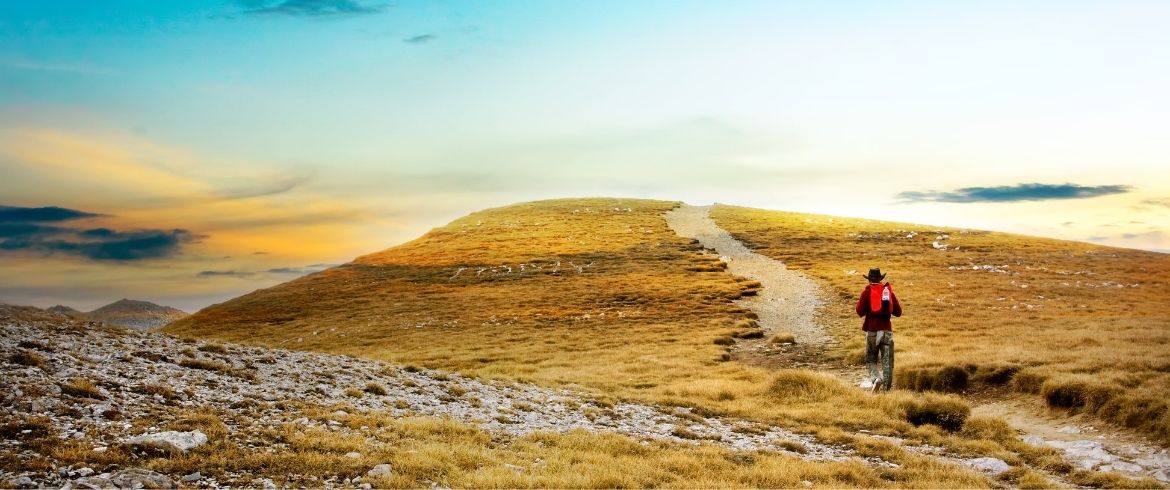
Sustainable tourism (or responsible tourism) is a real important concept. Find out the definition
This piece on sustainable tourism, its definition, principles, and types, is provided by Smart Writing Service , a professional essay writing service that cares about students. You may find out that the structure of this essay slightly differs from a standard one for a definition essay. That is done to include as many facts as possible in a condensed way. Feel free to use information you collect from this essay as you see appropriate.
The concept of “ sustainable tourism ” was formed relatively recently, along with the global concept of sustainable human development. The principles of sustainability in tourism, formulated by the UNWTO and the World Travel and Tourism Council, provide for:
- the conservation and enhancement of the natural and cultural potential of destinations, on the basis of a tourism approach aimed at sustainability;
- the ecological transition of tourism enterprises to resource-saving technologies, reduction of industrial waste;
- involvement of the population in the decision-making process on tourism development (a form of consultations);
- partnership in the relationship between the public and private sectors; promotion of tourism, socio-economic development of certain territories of states.
Many travel companies develop their own plans for the transition to the principles of sustainable development, implement environmental management systems, and apply environmental technologies.
The principles of sustainable development in the practice of tourism are spread under the influence of consumer demand . Given the awareness of the population about the state of the environment and the greening of people’s consciousness, the ecological situation becomes one of the decisive criteria for choosing a place or form of recreation.
This trend is reflected in the growing demand for alternative types of tourism , including eco-tourism.
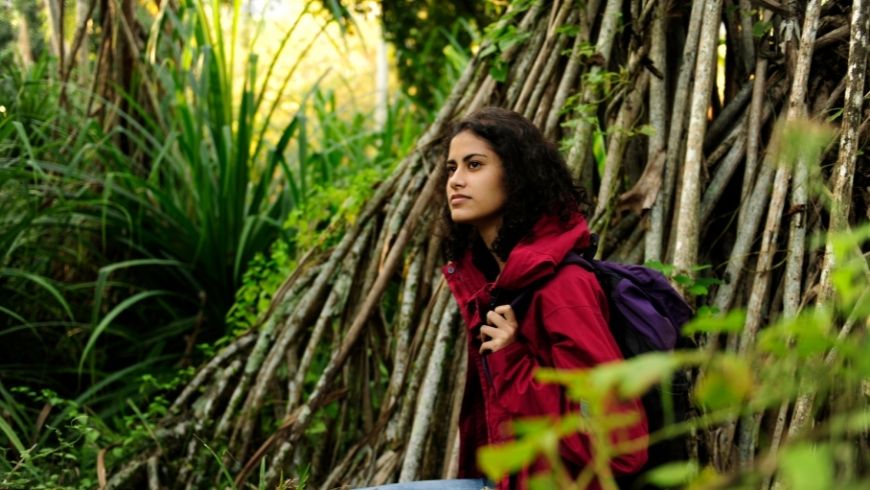
The development of this relatively new type of tourism is based on three main principles:
- part of the income received from the service of tourists remains in place and goes to nature protection ;
- the content of the basic law is in compliance with environmental requirements;
- tourism is conceived as an experience of discovering places, cultures and traditions, as a moment of exchange and mutual enrichment.
Ecotourism encompasses a wide variety of visitors who want to see animals or plants with their own eyes. For example, in Central America and southern Africa, predator sightings are of particular interest. Places, where wild orchids grow, have recently been discovered in Greece.

Tourists accompanied by a guide can visit these protected areas to admire the plants in the wild. Such trips can rightly be classified as ecological, and the persons who take part in them should be considered ecotourists.
Diversification of ecotourism activities is accompanied by the convergence of ecological and other types of tourism. Nature coverage is also inherent in the participants of the mass tourist movement. Swimming and beach holidays, cruises, business trips, are often combined with visits to national or natural and ethnographic parks. The boundaries of ecotourism are losing their clarity, and its scale and socio-economic importance are growing.
Almost every country has the opportunity to organize “green” travel. Today, the main ecotourism flows are directed to the United States, Canada, Australia, New Zealand, Mexico, Nepal, Ecuador, Brazil, Philippines and Kenya. In Europe some of the main Ecotourism destinations are Slovenia, Portugal, Croatia, Austria, Ireland. Ecological tourism is one of the most promising and dynamic forms of tourism.
With the growing requirements for the volume and quality of tourist services, with the emergence of new types and forms of tourist activity, the classification of tourism is changing.
Characteristics of sustainable tourism in 2021

You have probably heard of the term “ sustainable development “, which is closely linked to the green economy and means meeting the needs of present generations without compromising the future.
And what is sustainable tourism ? Let’s understand what we need to know and do to make our travels sustainable and our children able to see what we see now.
Sustainable tourism is:
- Availability . By supporting the tourism business, which allows you to get a full experience of travel, we stimulate economic development . This creates new jobs and increases the number of people who can use travel services and see the world.
- Animal safety and wellbeing . We must leave the wild alone . No elephant riding, no photoshoots with crocodiles, monkeys, and other animals. Just watch and don’t touch.
- Environmental protection . Minimization of damage in the process of tourist activity. Make sure that your trip does not have a negative impact on the environment . Even minimal. Just imagine what emotions would overwhelm you, if after a long trip to Norway instead of picturesque fjords you would be waiting for a huge dump…
- Controlled use of tourist services technologies . First of all, motor transport, energy, drinking water, etc. Tourism accounts for about 10% of all global carbon emissions . And this is 3.33 billion tons… They heat the planet, which leads to melting glaciers.
- Immersion in nature . The idea is to offer experiences that allow travelers to reconnect with nature.
Sustainable tourism vs popular and mass tourism

Features of the current stage of tourism development reveal the concept of “ mass tourism “, reflecting the process of democratization and expansion of tourism, especially in countries over the course, where more than half of the population are consumers of tourism goods and services. The concept of “mass tourism” was introduced and used as an alternative to aristocratic tourism of the XIX century, some expensive types of tourism aimed at selected audiences, and tourism in developing countries, where its development is limited due to low living standards.
Mass tourism should be distinguished from popular. The latter is a tourist activity that has gained wide recognition in society due to its attractiveness and accessibility. The definition of “mass” in the term characterizes the quantitative side of the concept, and the word “popular” – qualitative.
Mass tourism is in fact characterized by large numbers of tourists, who buy trips, such as cruises . This implies an overcrowding of places, a great impact on the environment, and a disadvantage for local populations. In fact, by involving thousands of tourists who go to the same place at the same time, mass tourism can generate Overtourism , damage the environment and upset the places.
On the contrary, sustainable tourism plays an important role in the economic development of places, giving it a boost. It contributes to the introduction and dissemination of new, higher standards of service and, consequently, to improve the quality of people’s lives .
In summary, sustainable tourism ensures that the environment will not be impacted by the arrivals of tourists and that the local community will take advantage of that.
You might also like

5 Sustainable Tourism Trends that you Must Know
Tourism is always evolving and for all operators in the sector it is essential to know the new trends so as to anticipate the wishes of future customers and align their offer accordingly. The beginning of the new decade has certainly shocked our world, but it has nevertheless confirmed our desire to travel, and the […]

Green Labels for Sustainable Tourism: an all in one Guide
Let’s discover the most important green labels for sustainable tourism and how to recognise them In the last years, due to a new consciousness for environmental topics, it has developed a new tendency in the way of travelling. More and more people don’t see any more travels as just a moment of relaxation, but they […]

Discovering sustainable tourism: its meaning and potential
Our blog is all about sustainable tourism. We share new ways of travelling and green travel experiences. We give tips on how to look after our environment and our nature. And we often (well, almost every day) talk about sustainable tourism through direct experiences and interviews. But what does sustainable tourism really mean? How is […]

Bike riding: the future of sustainable tourism
A conference in the heart of the countryside of Siena opens its doors to the quintessence of cycling. Let’s try to understand the ways of soft mobility in Tuscany… perfect starting point to understand the ontology of the bike and its connection with nature and health! Responsible tourism has two wheels… The third edition of […]
- Share full article
Advertisement
Supported by
The Getaway
Sustainable Travel: It’s Not Just About the Environment
A look at tours and programs that address the impact travelers have on the communities they visit.

By Elaine Glusac
The term “ sustainable travel ” has a green glow to it, connoting eco-friendly practices and environmental responsibility. But the human side of sustainability, as defined by the World Tourism Organization , addresses community impact, both social and economic, and is newly gaining traction among travel companies.
Social impact travel aims to ensure money spent on a tour or a trip stays in the community. A vital source of income to developing nations, travel is the first or second source of export earnings in 20 of the 48 least developed countries, according to the W.T.O., yet a 2013 report from the organization noted that just $5 of every $100 spent in a developing country stayed in that destination.
“There’s a lot of people who think ‘eco-tourism’ when they hear ‘sustainable tourism,’ but that’s a piece of the puzzle,” said Kelley Louise, the executive director of the Impact Travel Alliance , an industry nonprofit organization that focuses on sustainable travel. “Sustainability has a positive impact not only on the environment, but the culture and the economy of the destination you’re visiting.”
Among new developments, the Jordan Tourism Board created the Meaningful Travel Map of Jordan in March, highlighting 12 social enterprises in the country, including a Bedouin camp stay, a women’s weaving group and village tours that support local entrepreneurs. Last fall, the tour company Collette launched Impact Travel Tours , which spend half of the time sightseeing and the other half visiting community-based improvement projects. Earlier this year, the safari company andBeyond launched philanthropic-focused itineraries in Tanzania , Kenya and South Africa .
Organizations promoting social impact travel aim to emphasize not just big do-good trips, but to educate travelers about their smallest decisions, such as eating at a locally owned restaurant.
“Every time you have a meal, get accommodations or do activities, you can have a positive impact just by traveling,” said Paula Vlamings, the chief executive of Tourism Cares , a nonprofit organization representing the tourism industry that, among other programs, trains Good Travels advisers, travel agents who specialize in socially responsible travel experiences. “Leaving money in the community is such an important way to have a huge impact. The ripple effect, particularly for women, girls and the environment, demonstrates the power of travel.”
Some sustainable trips are priced like luxury vacations, a fact that prompted the 2015 launch of Giving Way , a platform linking volunteers directly with nongovernmental agencies, cutting out intermediaries that link the two.
“Volunteering should be accessible to everyone, not just a rich man’s privilege,” said Orit Strauss, the founder and chief executive of Giving Way, which now works with nearly 1,900 organizations in more than 115 countries. About half are free and the other half charge nominal fees to cover food and lodging. Activities range from working on an organic farm in Costa Rica to mentoring youth in rural South Africa.
Assessing the claims of a social impact travel company requires asking where the money goes. “That information isn’t readily available now,” said Salli Felton, of the nonprofit Travel Foundation , which tests programs that benefit local communities. “What’s critical is tracing the impact. If customers ask, they’ll start doing it. If they can’t answer that question, that should be a red flag.”
Doing good doesn’t require traveling through multiple time zones or long stays. New initiatives like Kind Traveler , which launched in 2016, aim to make each trip, however short, an opportunity to improve local lives. The hotel booking website offers discounted rooms to users who make a $10 donation to a charity affiliated with the hotel. Hotels are vetted for their sustainable practices, including environmental and community impacts. The company now offers hotels in 30 destinations in the United States, Mexico, Canada, Costa Rica and the Caribbean and plans to add hotels in Aspen, Colo., Washington, D.C., and Richmond, Va., this spring.
Day trips that take place in communities often give back to them. Ninth Ward Rebirth Bike Tours in New Orleans, for example, donates $5 of its $65 fee to local charities. Oyster hauling or crabbing with Virginia Watermen Heritage Tours provides a secondary source of income to fishermen in a string of coastal communities. The tour booking site Visit.org allows users to search for experiences by interests, including women’s empowerment and human rights.
When it launched its Experiences tours in 2016, Airbnb added social impact programs; 100 percent of the fees go to nonprofits and entrepreneurs highlighted in each tour. They may include an outing in Venice with the founder of a community garden, a LGBTQ history tour of New York with an activist or an experience making notebooks in Prague with the founder of a nonprofit that works with artisans challenged by mental and physical disabilities.
For those who have the time, tour operators offer myriad ways to contribute to social causes.
It’s not uncommon for safari companies in Africa to add community tours to their itineraries, often to show off how they’re spreading the wealth locally via education and health care. This year, andBeyond introduced Travel With Purpose trips, which spend more time visiting conservation and community projects based on the interests of millennial travelers interested in philanthropy.
“Only when you actually get your hands proverbially dirty by rolling up your sleeves and engaging in these projects and initiatives can you really learn and understand the issues and how we can make an impact, however small,” wrote Joss Kent, chief executive of andBeyond, in an email.
Many high-end tour operators such as Audley Travel and Scott Dunn partner with Me to We , the travel arm of the We Charity devoted to sustainable development, to offer social impact trips. African Travel, Inc. offers ME-to-WE Adventure to Kenya (four days from $2,195) in a Maasai Mara community, including learning traditional beading and helping to build a school. Me to We executives say half of its net profits go to the charity.
At Nimmo Bay Wilderness Resort in British Columbia, guests can pay to attend its 10-day May guide school alongside resort guides. For each paying traveler, the resort will sponsor training for an indigenous youth from the area. The program, launched this year, is already sold out, but the lodge plans to offer it again in 2019 (5,000 Canadian dollars, or about $3,910).
Village Ways , named best tour operator in the poverty reduction category in 2017 by Responsible Travel , a travel agency that specializes in sustainable travel, guides trips in Bhutan, India and Nepal that focus on village life. New this year, the company will offer trips with the Anwals , migratory shepherds in the Indian Himalayas, walking with them for two days as they drive their sheep to the high meadows. The rest of the time, guests walk from village to village, staying in local guesthouses (10 days from £1,052, or about $1,480).
What Is Ecotourism? Definition, Examples, and Pros and Cons
- Chapman University
- Sustainable Fashion
- Art & Media
Ecotourism Definition and Principles
Pros and cons.
- Examples of Ecotourism
- Frequently Asked Questions
Ecotourism is about more than simply visiting natural attractions or natural places; it’s about doing so in a responsible and sustainable manner. The term itself refers to traveling to natural areas with a focus on environmental conservation. The goal is to educate tourists about conservation efforts while offering them the chance to explore nature.
Ecotourism has benefited destinations like Madagascar, Ecuador, Kenya, and Costa Rica, and has helped provide economic growth in some of the world’s most impoverished communities. The global ecotourism market produced $92.2 billion in 2019 and is forecasted to generate $103.8 billion by 2027.
A conservationist by the name of Hector Ceballos-Lascurain is often credited with the first definition of ecotourism in 1987, that is, “tourism that consists in travelling to relatively undisturbed or uncontaminated natural areas with the specific object of studying, admiring and enjoying the scenery and its wild plants and animals, as well as any existing cultural manifestations (both past and present) found in these areas.”
The International Ecotourism Society (TIES), a non-profit organization dedicated to the development of ecotourism since 1990, defines ecotourism as “responsible travel to natural areas that conserves the environment, sustains the well-being of the local people, and involves interpretation and education [both in its staff and its guests].”
The International Union for Conservation of Nature (IUCN) looks at ecotourism as a significant tool for conservation, though it shouldn’t be seen as a fix-all when it comes to conservation challenges:
“There may be some areas that are just not appropriate for ecotourism development and some businesses that just won’t work in the larger tourism market. That is why it is so important to understand the basics of developing and running a successful business, to ensure that your business idea is viable and will be profitable, allowing it to most effectively benefit the surrounding environment and communities.”
Marketing an ecosystem, species, or landscape towards ecotourists helps create value, and that value can help raise funds to protect and conserve those natural resources.
Sustainable ecotourism should be guided by three core principles: conservation, communities, and education.
Conservation
Conservation is arguably the most important component of ecotourism because it should offer long-term, sustainable solutions to enhancing and protecting biodiversity and nature. This is typically achieved through economic incentives paid by tourists seeking a nature-based experience, but can also come from the tourism organizations themselves, research, or direct environmental conservation efforts.
Communities
Ecotourism should increase employment opportunities and empower local communities, helping in the fight against global social issues like poverty and achieving sustainable development.
Interpretation
One of the most overlooked aspects of ecotourism is the education component. Yes, we all want to see these beautiful, natural places, but it also pays to learn about them. Increasing awareness about environmental issues and promoting a greater understanding and appreciation for nature is arguably just as important as conservation.
As one of the fastest growing sectors of the tourism industry, there are bound to be some downsides to ecotourism. Whenever humans interact with animals or even with the environment, it risks the chance of human-wildlife conflict or other negative effects; if done so with respect and responsibility in mind, however, ecotourism can reap enormous benefits to protected areas.
As an industry that relies heavily on the presentation of eco-friendly components to attract customers, ecotourism has the inevitable potential as a vessel for greenwashing. Part of planning a trip rooted in ecotourism is doing research to ensure that an organization is truly providing substantial benefits to the environment rather than exploiting it.
Ecotourism Can Provide Sustainable Income for Local Communities
Sustainably managed ecotourism can support poverty alleviation by providing employment for local communities, which can offer them alternative means of livelihood outside of unsustainable ones (such as poaching).
Research published in Proceedings of the National Academy of Sciences found that communities in regions surrounding conservation areas in Costa Rica had poverty rates that were 16% lower than in areas that weren’t near protected parks. These protected areas didn’t just benefit from conservation funds due to ecotourism, but also helped to reduce poverty as well.
It Protects Natural Ecosystems
Ecotourism offers unique travel experiences focusing on nature and education, with an emphasis on sustainability and highlighting threatened or endangered species. It combines conservation with local communities and sustainable travel , highlighting principles (and operations) that minimize negative impacts and expose visitors to unique ecosystems and natural areas. When managed correctly, ecotourism can benefit both the traveler and the environment, since the money that goes into ecotourism often goes directly towards protecting the natural areas they visit.
Each year, researchers release findings on how tourist presence affects wildlife, sometimes with varying results. A study measuring levels of the stress hormone cortisol in wild habituated Malaysian orangutans found that the animals were not chronically stressed by the presence of ecotourists. The orangutans lived in the Lower Kinabatangan Wildlife Sanctuary, where a local community-managed organization operates while maintaining strict guidelines to protect them.
Ecotourism May Also Hurt Those Same Natural Ecosystems
Somewhat ironically, sometimes ecotourism can hurt ecosystems just as much as it can help. Another study in the journal Trends in Ecology and Evolution found that ecotourism can alter animal behaviors in ways that put them at risk. If the presence of humans changes the way animals behave, those changes may make them more vulnerable by influencing their reaction to predators or poachers.
It's not just the animals who are at risk. As ecotourism activities become too popular, it can lead to the construction of new infrastructure to accommodate more visitors. Similarly, more crowds mean more pressure on local resources, increased pollution, and a higher chance of damaging the soil and plant quality through erosion. On the social side, these activities may displace Indigenous groups or local communities from their native lands, preventing them from benefiting from the economic opportunities of tourism.
Ecotourism Offers the Opportunity to Experience Nature
Renown conservationist Jane Goodall has a famous quote: “Only if we understand, will we care. Only if we care, will we help. Only if we help, shall all be saved.” It can be difficult to understand something that we haven’t seen with our own eyes, and ecotourism gives travelers the opportunity to gain new experiences in natural areas while learning about the issues they face.
Ecotourism also educates children about nature, potentially creating new generations of nature lovers that could someday become conservationists themselves. Even adult visitors may learn new ways to improve their ecological footprints .
EXAMPLES OF ECOTOURISM
The East African country has some competitive advantages over its neighbors thanks to its rich natural resources, paired with the fact that it has allocated over 25% of its total area to wildlife national parks and protected areas. Because of this, an estimated 90% of tourists visit to Tanzania seeking out ecotourism activities. Ecotourism, in turn, supports 400,000 jobs and accounts for 17.2% of the national GDP, earning about $1 billion each year as its leading economic sector.
Some of Tanzania’s biggest highlights include the Serengeti, Mount Kilimanjaro , and Zanzibar, though the country still often goes overlooked by American tourists. Visitors can take a walking safari tour in the famous Ngorongoro Conservation area, for example, with fees going to support the local Maasai community.
The country is also known for its chimpanzees , and there are several ecotourism opportunities in Gombe National Park that go directly towards protecting chimpanzee habitats.
Galapagos Islands
It comes as no surprise that the place first made famous by legendary naturalist Charles Darwin would go on to become one of the most sought-after ecotourism destinations on Earth, the Galapagos Islands .
The Directorate of the Galapagos National Park and the Ecuadorian Ministry of Tourism require tour providers to conserve water and energy, recycle waste, source locally produced goods, hire local employees with a fair wage, and offer employees additional training. A total of 97% of the land area on the Galapagos is part of the official national park, and all of its 330 islands have been divided into zones that are either completely free of human impact, protected restoration areas, or reduced impact zones adjacent to tourist-friendly areas.
Local authorities still have to be on their toes, however, since UNESCO lists increased tourism as one of the main threats facing the Galapagos today. The bulk of funding for the conservation and management of the archipelago comes from a combination of governmental institutions and entry fees paid by tourists.
Costa Rica is well-known throughout the world for its emphasis on nature-based tourism, from its numerous animal sanctuaries to its plethora of national parks and reserves. Programs like its “Ecological Blue Flag” program help inform tourists of beaches that have maintained a strict set of eco-friendly criteria.
The country’s forest cover went from 26% in 1983 to over 52% in 2021 thanks to the government’s decision to create more protected areas and promote ecotourism in the country . Now, over a quarter of its total land area is zoned as protected territory.
Costa Rica welcomes 1.7 million travelers per year, and most of them come to experience the country’s vibrant wildlife and diverse ecosystems. Its numerous biological reserves and protected parks hold some of the most extraordinary biodiversity on Earth, so the country takes special care to keep environmental conservation high on its list of priorities.
New Zealand
In 2019, tourism generated $16.2 billion, or 5.8% of the GDP, in New Zealand. That same year, 8.4% of its citizens were employed in the tourism industry, and tourists generated $3.8 billion in tax revenue.
The country offers a vast number of ecotourism experiences, from animal sanctuaries to natural wildlife on land, sea, and even natural caves. New Zealand’s South Pacific environment, full of sights like glaciers and volcanic landscapes, is actually quite fragile, so the government puts a lot of effort into keeping it safe.
Tongariro National Park, for example, is the oldest national park in the country, and has been named by UNESCO as one of only 28 mixed cultural and natural World Heritage Sites. Its diverse volcanic landscapes and the cultural heritage of the indigenous Maori tribes within the create the perfect combination of community, education, and conservation.
How to Be a Responsible Ecotourist
- Ensure that the organizations you hire provide financial contributions to benefit conservation and find out where your money is going.
- Ask about specific steps the organization takes to protect the environment where they operate, such as recycling or promoting sustainable policies.
- Find out if they include the local community in their activities, such as hiring local guides, giving back, or through initiatives to empower the community.
- Make sure there are educational elements to the program. Does the organization take steps to respect the destination’s culture as well as its biodiversity?
- See if your organization is connected to a non-profit or charity like the International Ecotourism Society .
- Understand that wildlife interactions should be non-invasive and avoid negative impacts on the animals.
Ecotourism activities typically involve visiting and enjoying a natural place without disturbing the landscape or its inhabitants. This might involve going for a hike on a forest trail, mountain biking, surfing, bird watching, camping, or forest bathing .
Traveling in a way that minimizes carbon emissions, like taking a train or bike instead of flying, may also be part of an ecotourism trip. Because these modes of travel tend to be slower, they may be appreciated as enjoyable and relaxing ecotourism activities.
The Wolf Conservation Center ’s programing in New York State is an example of ecotourism. This non-profit organization is dedicated to the preservation of endangered wolf species. It hosts educational sessions that allow visitors to observe wolves from a safe distance. These programs help to fund the nonprofit organization’s conservation and wildlife rehabilitation efforts.
Stonehouse, Bernard. " Ecotourism ." Environmental Geology: Encyclopedia of Earth Science , 1999, doi:10.1007/1-4020-4494-1_101
" What is Ecotourism? " The International Ecotourism Society .
" Tourism ." International Union for Conservation of Nature .
https://doi.org/10.1073/pnas.1307712111
https://doi.org/10.1371/journal.pone.0033357
https://doi.org/10.1016/j.tree.2015.09.010
https://doi.org/10.5897/JHMT2016.0207
" Galapagos Islands ." UNESCO .
" About Costa Rica ." Embassy of Costa Rica in Washington DC .
https://www.stats.govt.nz/information-releases/tourism-satellite-account-2019
- What Is Sustainable Tourism and Why Is It Important?
- How to Be a Sustainable Traveler: 18 Tips
- Best of Green Awards 2021: Sustainable Travel
- Costa Rica’s Keys to Success as a Sustainable Tourism Pioneer
- What Is Community-Based Tourism? Definition and Popular Destinations
- What Is Voluntourism? Does It Help or Harm Communities?
- What Is Overtourism and Why Is It Such a Big Problem?
- Defeating Deforestation Through Rum, Chocolate, and Ecotourism
- Why Are National Parks Important? Environmental, Social, and Economic Benefits
- Why Bonobos Are Endangered and What We Can Do
- What Is a Wilderness Area? Definition and Examples
- The World’s Smallest Tiger Is Inching Towards Extinction
- Regenerative Travel: What It Is and How It's Outperforming Sustainable Tourism
- Top 8 Agritourism Destinations in the World
- 15 of the Most Beautiful Botanical Gardens in the US
- 15 of the Best City Parks in America
How global tourism can become more sustainable, inclusive and resilient

A sanitary mask lies on the ground at Frankfurt Airport Image: Reuters/Ralph Orlowski
.chakra .wef-1c7l3mo{-webkit-transition:all 0.15s ease-out;transition:all 0.15s ease-out;cursor:pointer;-webkit-text-decoration:none;text-decoration:none;outline:none;color:inherit;}.chakra .wef-1c7l3mo:hover,.chakra .wef-1c7l3mo[data-hover]{-webkit-text-decoration:underline;text-decoration:underline;}.chakra .wef-1c7l3mo:focus,.chakra .wef-1c7l3mo[data-focus]{box-shadow:0 0 0 3px rgba(168,203,251,0.5);} Ahmed Al-Khateeb

.chakra .wef-9dduvl{margin-top:16px;margin-bottom:16px;line-height:1.388;font-size:1.25rem;}@media screen and (min-width:56.5rem){.chakra .wef-9dduvl{font-size:1.125rem;}} Explore and monitor how .chakra .wef-15eoq1r{margin-top:16px;margin-bottom:16px;line-height:1.388;font-size:1.25rem;color:#F7DB5E;}@media screen and (min-width:56.5rem){.chakra .wef-15eoq1r{font-size:1.125rem;}} The Great Reset is affecting economies, industries and global issues

.chakra .wef-1nk5u5d{margin-top:16px;margin-bottom:16px;line-height:1.388;color:#2846F8;font-size:1.25rem;}@media screen and (min-width:56.5rem){.chakra .wef-1nk5u5d{font-size:1.125rem;}} Get involved with our crowdsourced digital platform to deliver impact at scale
Stay up to date:, the great reset.
- Tourism rose to the forefront of the global agenda in 2020, due to the devastating impact of COVID-19
- Recovery will be driven by technology and innovation – specifically seamless travel solutions, but it will be long, uneven and slow
- Success hinges on international coordination and collaboration across the public and private sectors
Tourism was one of the sectors hit hardest by the global pandemic. 2020 was the worst year on record for international travel due to the global pandemic, with countries taking decisive action to protect their citizens, closing borders and halting international travel.
The result was a 74% decline in international visitor arrivals, equivalent to over $1 trillion revenue losses , and an estimated 62 million fewer jobs . The impact on international air travel has been even more severe with a 90% drop on 2019 , resulting in a potential $1.8 trillion loss. And while the economic impact is dire in itself, nearly 2.9 million lives have been lost in the pandemic.
The path to recovery will be long and slow
Countries now face the challenge of reopening borders to resume travel and commerce, while protecting their populations’ health. At its peak, the World Tourism Organization (UNWTO) reported in April 2020 that every country on earth had implemented some travel restriction , signalling the magnitude of the operation to restart travel.
Have you read?
Tourism industry experts fear long road to recovery, how we can prioritize sustainability in rebuilding tourism, covid-19 could set the global tourism industry back 20 years.
Consequently, the path to recovery will be long and slow. The resurgence of cases following the discovery of new variants towards the end of last year delivered another disappointing blow to the travel industry. Any pickup over the summer months was quashed following a second wave of lockdowns and border closures . Coupled with mixed progress in the roll-out of vaccination programs, I predict that we will not see a significant rebound in international travel until the middle of this year at best.
Others echo my fears. The International Air Transport Association (IATA) forecasts a 50.4% improvement on 2020 air travel demand, which would bring the industry to 50.6% of 2019 levels . However, a more pessimistic outlook based on the persistence of travel restrictions suggests that demand may only pick up by 13% this year, leaving the industry at 38% of 2019 levels. McKinsey & Company similarly predict that tourism expenditure may not return to pre-COVID-19 levels until 2024 .
How to enhance sustainability, inclusivity and resilience
Given its economic might – employing 330 million people, contributing 10% to global GDP before the pandemic, and predicted to create 100 million new jobs – restoring the travel and tourism sector to a position of strength is the utmost priority.
The Great Reset provides an opportunity to rethink how tourism is delivered and to enhance sustainability, inclusivity and resilience. We must also address the challenges – from climate change and “ overtourism ” to capacity constraints – that we faced before the pandemic, while embracing traveller preferences, as we rebuild.
A 2018 study found that global tourism accounted for 8% of global greenhouse gas emissions from 2009 to 2013 ; four times higher than previous estimates. Even more worryingly, this puts progress towards the Paris Agreement at risk – recovery efforts must centre around environmental sustainability.
Furthermore, according to a study on managing overcrowding, the top 20 most popular global destinations were predicted to add more international arrivals than the rest of the world combined by 2020 . While COVID-19 will have disrupted this trend, it is well known that consumers want to travel again, and we must address the issues associated with overcrowding, especially in nascent destinations, like Saudi Arabia.
The Great Reset is a chance to make sure that as we rebuild, we do it better.

Seamless solutions lie at the heart of travel recovery
Tourism has the potential to be an engine of economic recovery provided we work collaboratively to adopt a common approach to a safe and secure reopening process – and conversations on this are already underway.
Through the G20, which Saudi Arabia hosted in 2020, our discussions focused on how to leverage technology and innovation in response to the crisis, as well as how to restore traveller confidence and improve the passenger experience in the future .
At the global level, across the public and private sectors, the World Economic Forum is working with the Commons Project on the CommonPass framework , which will allow individuals to access lab results and vaccination records, and consent to having that information used to validate their COVID status. IATA is trialling the Travel Pass with airlines and governments , which seeks to be a global and standardized solution to validate and authenticate all country regulations regarding COVID-19 travel requirements.
The provision of solutions that minimize person-to-person contact responds to consumer wants, with IATA finding that 85% of travellers would feel safer with touchless processing . Furthermore, 44% said they would share personal data to enable this, up from 30% months prior , showing a growing trend for contactless travel processes.
Such solutions will be critical in coordinating the opening of international borders in a way that is safe, seamless and secure, while giving tourists the confidence to travel again.
Collaboration at the international level is critical
The availability of vaccines will make this easier, and we have commenced our vaccination programme in Saudi Arabia . But we need to ensure processes and protocols are aligned globally, and that we support countries with limited access to vaccinations to eliminate the threat of another resurgence. It is only when businesses and travellers have confidence in the systems that the sector will flourish again.
In an era of unprecedented data and ubiquitous intelligence, it is essential that organizations reimagine how they manage personal data and digital identities. By empowering individuals and offering them ways to control their own data, user-centric digital identities enable trusted physical and digital interactions – from government services or e-payments to health credentials, safe mobility or employment.

The World Economic Forum curates the Platform for Good Digital Identity to advance global digital identity activities that are collaborative and put the user interest at the center.
The Forum convenes public-private digital identity collaborations from travel, health, financial services in a global action and learning network – to understand common challenges and capture solutions useful to support current and future coalitions. Additionally, industry-specific models such as Known Traveller Digital Identity or decentralized identity models show that digital identity solutions respecting the individual are possible.
The approach taken by Saudi Arabia and its partners to establish consensus and build collaborative relationships internationally and between the public and private sectors, should serve as a model to be replicated so that we can maximize the tourism sector’s contribution to the global economic recovery, while ensuring that it becomes a driver of prosperity and social progress again.
Don't miss any update on this topic
Create a free account and access your personalized content collection with our latest publications and analyses.
License and Republishing
World Economic Forum articles may be republished in accordance with the Creative Commons Attribution-NonCommercial-NoDerivatives 4.0 International Public License, and in accordance with our Terms of Use.
The views expressed in this article are those of the author alone and not the World Economic Forum.
Related topics:
The agenda .chakra .wef-n7bacu{margin-top:16px;margin-bottom:16px;line-height:1.388;font-weight:400;} weekly.
A weekly update of the most important issues driving the global agenda
.chakra .wef-1dtnjt5{display:-webkit-box;display:-webkit-flex;display:-ms-flexbox;display:flex;-webkit-align-items:center;-webkit-box-align:center;-ms-flex-align:center;align-items:center;-webkit-flex-wrap:wrap;-ms-flex-wrap:wrap;flex-wrap:wrap;} More on Industries in Depth .chakra .wef-17xejub{-webkit-flex:1;-ms-flex:1;flex:1;justify-self:stretch;-webkit-align-self:stretch;-ms-flex-item-align:stretch;align-self:stretch;} .chakra .wef-nr1rr4{display:-webkit-inline-box;display:-webkit-inline-flex;display:-ms-inline-flexbox;display:inline-flex;white-space:normal;vertical-align:middle;text-transform:uppercase;font-size:0.75rem;border-radius:0.25rem;font-weight:700;-webkit-align-items:center;-webkit-box-align:center;-ms-flex-align:center;align-items:center;line-height:1.2;-webkit-letter-spacing:1.25px;-moz-letter-spacing:1.25px;-ms-letter-spacing:1.25px;letter-spacing:1.25px;background:none;padding:0px;color:#B3B3B3;-webkit-box-decoration-break:clone;box-decoration-break:clone;-webkit-box-decoration-break:clone;}@media screen and (min-width:37.5rem){.chakra .wef-nr1rr4{font-size:0.875rem;}}@media screen and (min-width:56.5rem){.chakra .wef-nr1rr4{font-size:1rem;}} See all

Top 5 countries leading the sustainable tourism sector

Robot rock stars, pocket forests, and the battle for chips - Forum podcasts you should hear this month
Robin Pomeroy and Linda Lacina
April 29, 2024

Agritech: Shaping Agriculture in Emerging Economies, Today and Tomorrow

Confused about AI? Here are the podcasts you need on artificial intelligence
Robin Pomeroy
April 25, 2024

Which technologies will enable a cleaner steel industry?
Daniel Boero Vargas and Mandy Chan

Industry government collaboration on agritech can empower global agriculture
Abhay Pareek and Drishti Kumar
April 23, 2024
Sustainable tourism
Related sdgs, promote sustained, inclusive and sustainable ....

Description
Publications.
Tourism is one of the world's fastest growing industries and an important source of foreign exchange and employment, while being closely linked to the social, economic, and environmental well-being of many countries, especially developing countries. Maritime or ocean-related tourism, as well as coastal tourism, are for example vital sectors of the economy in small island developing States (SIDS) and coastal least developed countries (LDCs) (see also: The Potential of the Blue Economy report as well as the Community of Ocean Action on sustainable blue economy).
The World Tourism Organization defines sustainable tourism as “tourism that takes full account of its current and future economic, social and environmental impacts, addressing the needs of visitors, the industry, the environment and host communities".
Based on General assembly resolution 70/193, 2017 was declared as the International Year of Sustainable Tourism for Development.
In the 2030 Agenda for Sustainable Development SDG target 8.9, aims to “by 2030, devise and implement policies to promote sustainable tourism that creates jobs and promotes local culture and products”. The importance of sustainable tourism is also highlighted in SDG target 12.b. which aims to “develop and implement tools to monitor sustainable development impacts for sustainable tourism that creates jobs and promotes local culture and products”.
Tourism is also identified as one of the tools to “by 2030, increase the economic benefits to Small Island developing States and least developed countries” as comprised in SDG target 14.7.
In the Rio+20 outcome document The Future We want, sustainable tourism is defined by paragraph 130 as a significant contributor “to the three dimensions of sustainable development” thanks to its close linkages to other sectors and its ability to create decent jobs and generate trade opportunities. Therefore, Member States recognize “the need to support sustainable tourism activities and relevant capacity-building that promote environmental awareness, conserve and protect the environment, respect wildlife, flora, biodiversity, ecosystems and cultural diversity, and improve the welfare and livelihoods of local communities by supporting their local economies and the human and natural environment as a whole. ” In paragraph 130, Member States also “call for enhanced support for sustainable tourism activities and relevant capacity-building in developing countries in order to contribute to the achievement of sustainable development”.
In paragraph 131, Member States “encourage the promotion of investment in sustainable tourism, including eco-tourism and cultural tourism, which may include creating small- and medium-sized enterprises and facilitating access to finance, including through microcredit initiatives for the poor, indigenous peoples and local communities in areas with high eco-tourism potential”. In this regard, Member States also “underline the importance of establishing, where necessary, appropriate guidelines and regulations in accordance with national priorities and legislation for promoting and supporting sustainable tourism”.
In 2002, the World Summit on Sustainable Development in Johannesburg called for the promotion of sustainable tourism development, including non-consumptive and eco-tourism, in Chapter IV, paragraph 43 of the Johannesburg Plan of Implementation.
At the Johannesburg Summit, the launch of the “Sustainable Tourism – Eliminating Poverty (ST-EP) initiative was announced. The initiative was inaugurated by the World Tourism Organization, in collaboration with UNCTAD, in order to develop sustainable tourism as a force for poverty alleviation.
The UN Commission on Sustainable Development (CSD) last reviewed the issue of sustainable tourism in 2001, when it was acting as the Preparatory Committee for the Johannesburg Summit.
The importance of sustainable tourism was also mentioned in Agenda 21.
For more information and documents on this topic, please visit this link
UNWTO Annual Report 2015
2015 was a landmark year for the global community. In September, the 70th Session of the United Nations General Assembly adopted the Sustainable Development Goals (SDGs), a universal agenda for planet and people. Among the 17 SDGs and 169 associated targets, tourism is explicitly featured in Goa...
UNWTO Annual Report 2016
In December 2015, the United Nations General Assembly declared 2017 as the International Year of Sustainable Tourism for Development. This is a unique opportunity to devote a year to activities that promote the transformational power of tourism to help us reach a better future. This important cele...
Emerging Issues for Small Island Developing States
The 2012 UNEP Foresight Process on Emerging Global Environmental Issues primarily identified emerging environmental issues and possible solutions on a global scale and perspective. In 2013, UNEP carried out a similar exercise to identify priority emerging environmental issues that are of concern to ...
Transforming our World: The 2030 Agenda for Sustainable Development
This Agenda is a plan of action for people, planet and prosperity. It also seeks to strengthen universal peace in larger freedom, We recognize that eradicating poverty in all its forms and dimensions, including extreme poverty, is the greatest global challenge and an indispensable requirement for su...
Status and Trends of Caribbean Coral Reefs: 1970-2012
Previous Caribbean assessments lumped data together into a single database regardless of geographic location, reef environment, depth, oceanographic conditions, etc. Data from shallow lagoons and back reef environments were combined with data from deep fore-reef environments and atolls. Geographic c...
15 Years of the UNWTO World Tourism Network on Child Protection: A Compilation of Good Practices
Although it is widely recognized that tourism is not the cause of child exploitation, it can aggravate the problem when parts of its infrastructure, such as transport networks and accommodation facilities, are exploited by child abusers for nefarious ends. Additionally, many other factors that contr...
Towards Measuring the Economic Value of Wildlife Watching Tourism in Africa
Set against the backdrop of the ongoing poaching crisis driven by a dramatic increase in the illicit trade in wildlife products, this briefing paper intends to support the ongoing efforts of African governments and the broader international community in the fight against poaching. Specifically, this...
Natural Resources Forum: Special Issue Tourism
The journal considers papers on all topics relevant to sustainable development. In addition, it dedicates series, issues and special sections to specific themes that are relevant to the current discussions of the United Nations Commission on Sustainable Development (CSD)....
Thailand: Supporting Sustainable Development in Thailand: A Geographic Clusters Approach
Market forces and government policies, including the Tenth National Development Plan (2007-2012), are moving Thailand toward a more geographically specialized economy. There is a growing consensus that Thailand’s comparative and competitive advantages lie in amenity services that have high reliance...
Road Map on Building a Green Economy for Sustainable Development in Carriacou and Petite Martinique, Grenada
This publication is the product of an international study led by the Division for Sustainable Development (DSD) of the United Nations Department of Economic and Social Affairs (UNDESA) in cooperation with the Ministry of Carriacou and Petite Martinique Affairs and the Ministry of Environment, Foreig...
Natural Resources Forum, a United Nations Sustainable Development Journal (NRF)
Natural Resources Forum, a United Nations Sustainable Development Journal, seeks to address gaps in current knowledge and stimulate relevant policy discussions, leading to the implementation of the sustainable development agenda and the achievement of the Sustainable...
UN Ocean Conference 2025
Our Ocean, Our Future, Our Responsibility “The ocean is fundamental to life on our planet and to our future. The ocean is an important source of the planet’s biodiversity and plays a vital role in the climate system and water cycle. The ocean provides a range of ecosystem services, supplies us with
UN Ocean Conference 2022
The UN Ocean Conference 2022, co-hosted by the Governments of Kenya and Portugal, came at a critical time as the world was strengthening its efforts to mobilize, create and drive solutions to realize the 17 Sustainable Development Goals by 2030.
58th Session of the Commission for Social Development – CSocD58
22nd general assembly of the united nations world tourism organization, world tourism day 2017 official celebration.
This year’s World Tourism Day, held on 27 September, will be focused on Sustainable Tourism – a Tool for Development. Celebrated in line with the 2017 International Year of Sustainable Tourism for Development, the Day will be dedicated to exploring the contribution of tourism to the Sustainable Deve
World Tourism Day 2016 Official Celebration
Accessible Tourism for all is about the creation of environments that can cater for the needs of all of us, whether we are traveling or staying at home. May that be due to a disability, even temporary, families with small children, or the ageing population, at some point in our lives, sooner or late
4th Global Summit on City Tourism
The World Tourism Organisation (UNWTO) and the Regional Council for Tourism of Marrakesh with support of the Government of Morroco are organizing the 4th Global Summit on City Tourism in Marrakesh, Morroco (9-10 December 2015). International experts in city tourism, representatives of city DMOs, of
2nd Euro-Asian Mountain Resorts Conference
The World Tourism Organisation (UNWTO) and Ulsan Metropolitan City with support of the Government of the Republic of Korea are organizing the 2nd Euro-Asian Mountain Resorts Conference, in Ulsan, Republic of Korea (14 - 16 October 2015). Under the title “Paving the Way for a Bright Future for Mounta
21st General Assembly of the United Nations World Tourism Organization
Unwto regional conference enhancing brand africa - fostering tourism development.
Tourism is one of the Africa’s most promising sectors in terms of development, and represents a major opportunity to foster inclusive development, increase the region’s participation in the global economy and generate revenues for investment in other activities, including environmental preservation.
- January 2017 International Year of Tourism In the context of the universal 2030 Agenda for Sustainable Development and the Sustainable Development Goals (SDGs), the International Year aims to support a change in policies, business practices and consumer behavior towards a more sustainable tourism sector that can contribute to the SDGs.
- January 2015 Targets 8.9, 12 b,14.7 The 2030 Agenda for Sustainable Development commits Member States, through Sustainable Development Goal Target 8.9 to “devise and implement policies to promote sustainable tourism that creates jobs and promotes local culture and products”. The importance of sustainable tourism, as a driver for jobs creation and the promotion of local culture and products, is also highlighted in Sustainable Development Goal target 12.b. Tourism is also identified as one of the tools to “increase [by 2030] the economic benefits to Small Island developing States and least developed countries”, through Sustainable Development Goals Target 14.7.
- January 2012 Future We Want (Para 130-131) Sustainable tourism is defined as a significant contributor “to the three dimensions of sustainable development” thanks to its close linkages to other sectors and its ability to create decent jobs and generate trade opportunities. Therefore, Member States recognize “the need to support sustainable tourism activities and relevant capacity-building that promote environmental awareness, conserve and protect the environment, respect wildlife, flora, biodiversity, ecosystems and cultural diversity, and improve the welfare and livelihoods of local communities” as well as to “encourage the promotion of investment in sustainable tourism, including eco-tourism and cultural tourism, which may include creating small and medium sized enterprises and facilitating access to finance, including through microcredit initiatives for the poor, indigenous peoples and local communities in areas with high eco-tourism potential”.
- January 2009 Roadmap for Recovery UNWTO announced in March 2009 the elaboration of a Roadmap for Recovery to be finalized by UNWTO’s General Assembly, based on seven action points. The Roadmap includes a set of 15 recommendations based on three interlocking action areas: resilience, stimulus, green economy aimed at supporting the tourism sector and the global economy.
- January 2008 Global Sustainable Tourism Criteria The Global Sustainable Tourism Criteria represent the minimum requirements any tourism business should observe in order to ensure preservation and respect of the natural and cultural resources and make sure at the same time that tourism potential as tool for poverty alleviation is enforced. The Criteria are 41 and distributed into four different categories: 1) sustainability management, 2) social and economic 3) cultural 4) environmental.
- January 2003 1st Int. Conf. on Climate Change and Tourism The conference was organized in order to gather tourism authorities, organizations, businesses and scientists to discuss on the impact that climate change can have on the tourist sector. The event took place from 9 till 11 April 2003 in Djerba, Tunisia.
- January 2003 WTO becomes a UN specialized body By Resolution 453 (XV), the Assembly agreed on the transformation of the WTO into a United Nations specialized body. Such transformation was later ratified by the United Nations General Assembly with the adoption of Resolution A/RES/58/232.
- January 2002 World Ecotourism Summit Held in May 2002, in Quebec City, Canada, the Summit represented the most important event in the framework of the International Year of Ecosystem. The Summit identified as main themes: ecotourism policy and planning, regulation of ecotourism, product development, marketing and promotion of ecotourism and monitoring costs and benefits of ecotourism.
- January 1985 Tourism Bill of Rights and Tourist Code At the World Tourism Organization Sixth Assembly held in Sofia in 1985, the Tourism Bill of Rights and Tourist Code were adopted, setting out the rights and duties of tourists and host populations and formulating policies and action for implementation by states and the tourist industry.
- January 1982 Acapulco Document Adopted in 1982, the Acapulco Document acknowledges the new dimension and role of tourism as a positive instrument towards the improvement of the quality of life for all peoples, as well as a significant force for peace and international understanding. The Acapulco Document also urges Member States to elaborate their policies, plans and programmes on tourism, in accordance with their national priorities and within the framework of the programme of work of the World Tourism Organization.
National Geographic content straight to your inbox—sign up for our popular newsletters here

A train glides past Switzerland's snowcapped mountains, one way travelers can see the world while reducing their carbon footprint.
6 Ways to Be a More Sustainable Traveler
Reduce your impact on the planet, support local economies, and protect wildlife.
The United Nations designated 2017 the International Year of Sustainable Tourism for Development —an opportunity to raise global awareness about how responsible tourism can act as a vehicle for positive change.
The three pillars of sustainable tourism are employing environmentally friendly practices (reduce, reuse, recycle); protecting cultural and natural heritage (restoring historic buildings or saving endangered species); and providing tangible social and economic benefits for local communities (ranging from upholding the rights of indigenous peoples to supporting fair wages for employees). Here are six things globetrotters can do to ease their impact on the planet:
Avoid the plane and take the train.
Become part of the emerging “slow travel” trend by going to fewer places and spending more time in each. Train travel is a good way to do this. Not only will you experience a deeper sense of place, you’ll also decrease your carbon footprint. Some of my favorite travel-by-train destinations include India , Southeast Asia, East Africa, and China .
Give, the right way.
Many well-intentioned travelers bring sweets, used clothing, books, and pencils to hand out to children and villagers in developing nations. Sadly, this kind giving often has unintended consequences—it can sow community conflict and encourage a culture of dependency and begging. I watched two Maasai women in Africa fight over a T-shirt that a smiling tourist had handed out; in some parts of Asia, the first English words children learn are “Give me sweet.”
It is better to give—be it money or goods—to reputable local organizations that work on social welfare programs, or to international groups that partner with them. A good one is Pack for a Purpose .
Say no to plastic.
The Great Pacific Garbage Patch , a swirling mass of human trash stretching across thousands of miles of the ocean, includes gazillions of throw-away plastic bottles and bags that will take hundreds of years, if ever, to break down—all the while wreaking havoc on marine ecosystems.
Be a part of the solution by opting for locally purified water in recyclable glass bottles (in the tropics, I rely mainly on green coconuts to stay hydrated) and carrying tote bags in your luggage that you can use while perusing street markets and shops. Not only will this cut back on plastic waste, it will also reduce your carbon footprint–petroleum-based ingredients are a staple in manufacturing plastic bottles and bags.
Research your tour operators.
I explore on my own most of the time when I travel, but when I do seek out the services of a tour outfitter, I always ask three questions before signing on: What are some of your tour company’s environmentally friendly practices? Can you give me an example of how your trips help to protect and support wildlife or cultural heritage? Do you employ local guides on your trips?
These days, any outfitter that cannot provide a clear answer is behind the times. Find another one.
Support the real local economy.
Locally made crafts and souvenirs are not always cheaper, but purchasing them ensures your contribution to the economy will have a more direct and positive impact.
- Nat Geo Expeditions
In Cancun, for example, some gift shops sell “traditional” Mexican sombreros that are imported from China because they cost less, while village artisans who make the hats by hand charge more. The difference is not just in the price. Buying the real sombreros supports authentic cultural heritage and provides needed jobs for the locals who make them.
Never buy wildlife products—period.
On a trip to Vietnam’s Halong Bay, I watched a group of American tourists haggling with villagers who were selling some of the most beautiful sea shells I have come across in my travels.
Similarly, in Mongolia , I witnessed a couple of backpackers haggling at an outdoor market to buy a hand-stitched eagle hunter’s hat made from plush wolf fur. These travelers were inadvertently helping to support a growing marketplace for trafficking rare and endangered wildlife products as souvenirs. Just say no.
For Hungry Minds
Related topics.
- SUSTAINABLE TOURISM
You May Also Like

10 whimsical ways to experience Scotland

Looking for a truly remote, off-the-grid adventure? Try Panama.

10 of the best UK destinations for spring travel

They inspire us and teach us about the world: Meet our 2024 Travelers of the Year


Bears, wolves and rewilding in Romania's Southern Carpathian mountains
- Paid Content
- Environment
- Photography
- Perpetual Planet
History & Culture
- History & Culture
- History Magazine
- Mind, Body, Wonder
- Terms of Use
- Privacy Policy
- Your US State Privacy Rights
- Children's Online Privacy Policy
- Interest-Based Ads
- About Nielsen Measurement
- Do Not Sell or Share My Personal Information
- Nat Geo Home
- Attend a Live Event
- Book a Trip
- Inspire Your Kids
- Shop Nat Geo
- Visit the D.C. Museum
- Learn About Our Impact
- Support Our Mission
- Advertise With Us
- Customer Service
- Renew Subscription
- Manage Your Subscription
- Work at Nat Geo
- Sign Up for Our Newsletters
- Contribute to Protect the Planet
Copyright © 1996-2015 National Geographic Society Copyright © 2015-2024 National Geographic Partners, LLC. All rights reserved
Advertisement
Let us take a walk to the sustainable tourism practices: a qualitative study through the lens of tourism experts
- Research Article
- Published: 04 January 2024
- Volume 31 , pages 12892–12915, ( 2024 )
Cite this article

- Vikas Arya 1 ,
- Vilte Auruskeviciene ORCID: orcid.org/0000-0002-1563-4052 2 ,
- Srishti Agarwal 3 ,
- Priyanka Kokatnur 3 ,
- Harish Kumar 4 &
- Rajeev Verma 5
474 Accesses
Explore all metrics
The rising opportunities of sustainable tourism have brought many policies to control the exploitation of the environment and increase the reach of luxurious, safe, and authentic experiences to the different segments of tourists. This study seeks to prioritize the variables influencing the development of sustainable tourism and pinpoint key success factors that align with the Sustainable Development Goals (SDGs). It adopts a tri-dimensional framework encompassing economic, social, and environmental aspects, further delineated into eleven sub-dimensions, to provide a quantitative evaluation of sustainable tourism. We conducted interviews with 26 tourism industry experts hailing from eight countries, analyzing their responses using interval type-2 fuzzy sets. The results underscore the critical role of specific components in advancing sustainable tourism. In the economic dimension, “financial resources and tourism costs” emerge as vital factors. In the social dimension, “health and safety” takes center stage, while “green infrastructure” plays a pivotal role in the environmental dimension. These findings underscore the significance of these aspects in promoting sustainable tourism. Furthermore, this study explores the strategic importance of sustainable tourism equity in shaping tourism planning and development for emerging markets.
This is a preview of subscription content, log in via an institution to check access.
Access this article
Price includes VAT (Russian Federation)
Instant access to the full article PDF.
Rent this article via DeepDyve
Institutional subscriptions
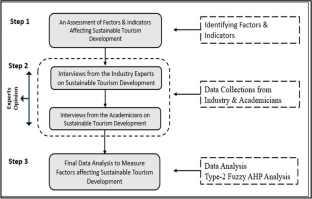
Source: Authors
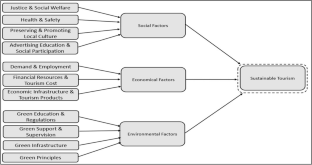
Similar content being viewed by others

Three pillars of sustainability: in search of conceptual origins
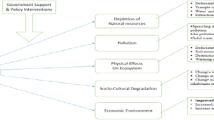
Impact of tourism development upon environmental sustainability: a suggested framework for sustainable ecotourism
Smart tourism: foundations and developments, data availability.
Data will be available on request.
Agarwal SA, Kasliwal N (2019) Indian consumer’s environmental consciousness and decision towards green services of hospitality industry. J Hosp Appl Res 14(2):22–40
Google Scholar
Ahmad N, Youjin L, Hdia M (2022) The role of innovation and tourism in sustainability: why is environment-friendly tourism necessary for entrepreneurship? J Clean Prod 379:134799. https://doi.org/10.1016/j.jclepro.2022.134799
Article Google Scholar
Alfaro Navarro JL, Andrés Martínez ME, Mondéjar Jiménez JA (2020) An approach to measuring sustainable tourism at the local level in Europe. Curr Issue Tour 23(4):423–437. https://doi.org/10.1080/13683500.2019.1579174
Andereck KL, Valentine KM, Knopf RC, Vogt CA, Knollenberg W (2021) Tourists’ willingness to conserve resources and reduce their carbon footprint in national parks. J Sustain Tour 29(4):499–516
Andria J, di Tollo G, Pesenti R (2019) A fuzzy evaluation of tourism sustainability. In Business and consumer analytics: New ideas pp 911–932. Springer, Cham. https://doi.org/10.1007/978-3-030-06222-4_24
Apak ÖC, Gürbüz A (2023) The effect of local food consumption of domestic tourists on sustainable tourism. J Retail Consum Serv 71:103192. https://doi.org/10.1016/j.jretconser.2022.103192
Arya V, Sethi D, Paul J (2019) Does digital footprint act as a digital asset? — enhancing brand experience through remarketing. Int J Inf Manage 49:142–156. https://doi.org/10.1016/j.ijinfomgt.2019.03.013
Arya V, Sharma S, Sethi D, Verma H, Shiva A (2018) Ties that bind tourists: embedding destination motivators to destination attachment: a study in the context of Kumbh Fair India. Asia Pacific J Tour Res 23(12):1160–1172. https://doi.org/10.1080/10941665.2018.1528992
Arya V, Sambyal R, Sharma A, Dwivedi YK (2023) Brands are calling your AVATAR in Metaverse—a study to explore XR‐based gamification marketing activities and consumer‐based brand equity in virtual world. Journal of Consumer Behaviour. https://doi.org/10.1002/cb.2214
Athari SA, Alola UV, Ghasemi M, Alola AA (2021) The (Un) sticky role of exchange and inflation rate in tourism development: insight from the low and high political risk destinations. Curr Issue Tour 24(12):1670–1685. https://doi.org/10.1080/13683500.2020.1798893
Balsalobre-Lorente D, Abbas J, He C, Pilař L, Shah SAR (2023a) Tourism, urbanization and natural resources rents matter for environmental sustainability: the leading role of AI and ICT on sustainable development goals in the digital era. Resour Policy 82:103445. https://doi.org/10.1016/j.resourpol.2023.103445
Balsalobre-Lorente D, Luzon LI, Usman M, Jahanger A (2023) The relevance of international tourism and natural resource rents in economic growth: fresh evidence from MINT countries in the digital era. Environ Sci Pollut Res 1–18. https://doi.org/10.1007/s11356-022-25022-0
Barbieri C, Sotomayor S, Gil Arroyo C (2020) Sustainable tourism practices in indigenous communities: the case of the Peruvian Andes. Tour Plann Dev 17(2):207–224. https://doi.org/10.1080/21568316.2019.1597760
Beames S, Mackenzie SH, Raymond E (2022) How can we adventure sustainably? A systematized review of sustainability guidance for adventure tourism operators. J Hosp Tour Manag 50:223–231. https://doi.org/10.1016/j.jhtm.2022.01.002
Becken S, Loehr J (2022) Tourism governance and enabling drivers for intensifying climate action. Journal of Sustainable Tourism 1–19. https://doi.org/10.1080/09669582.2022.2032099
Becken S, Stantic B, Chen JS (2020) Climate change and tourism: impacts and challenges. Tourism Review 75(1):46–60
Berno T, Rajalingam G, Miranda AI, Ximenes J (2022) Promoting sustainable tourism futures in Timor-Leste by creating synergies between food, place and people. J Sustain Tour 30(2–3):500–514. https://doi.org/10.1080/09669582.2021.1895819
Bodhanwala S, Bodhanwala R (2022) Exploring relationship between sustainability and firm performance in travel and tourism industry: a global evidence. Social Respons J 18(7):1251–1269. https://doi.org/10.1108/SRJ-09-2020-0360
Bramwell B, Lane B (2019) Critical research on the governance and management of tourism in protected areas. Curr Issue Tour 22(5):547–579
Briassoulis H (2002) Sustainable tourism and the question of the commons. Ann Tour Res 29(4):1065–1085. https://doi.org/10.1016/S0160-7383(02)00021-X
Bricker KS, Schultz J (2011) Sustainable tourism in the USA: a comparative look at the Global Sustainable Tourism Criteria. Tour Recreat Res 36(3):215–229
Bramwell B, Lane B (2011) Critical research on the governance of tourism and sustainability. J Sustain Tour 19(4–5):411–421. https://doi.org/10.1080/02508281.2011.11081668
Budeanu A, Miller G, Moscardo G, Ooi CS (2016) Sustainable tourism, progress, challenges and opportunities: an introduction. J Clean Prod 111:285–294. https://doi.org/10.1016/j.jclepro.2015.10.027
Buckley R (2012) Sustainable tourism: research and reality. Ann Tour Res 39(2):528–546. https://doi.org/10.1016/j.annals.2012.02.003
Article MathSciNet Google Scholar
Carlson J, Rahman MM, Rosenberger PJ III, Holzmüller HH (2016) Understanding communal and individual customer experiences in group-oriented event tourism: an activity theory perspective. J Mark Manag 32(9–10):900–925. https://doi.org/10.1080/0267257X.2016.1181099
Chandra P, Kumar J (2021) Strategies for developing sustainable tourism business in the Indian Himalayan Region: insights from Uttarakhand, the Northern Himalayan State of India. J Destin Mark Manag 19:100546. https://doi.org/10.1016/j.jdmm.2020.100546
Choe J, O’Regan M, Kimbu A, Lund NF, Ladkin A (2021) Quality of life perspectives for different social groups in a World Centre of Tourism and Leisure. Tour Stud 21(4):615–637. https://doi.org/10.1177/14687976211038758
Choi HSC, Sirakaya E (2005) Measuring residents’ attitude toward sustainable tourism: development of sustainable tourism attitude scale. J Travel Res 43(4):380–394. https://doi.org/10.1177/0047287505274651
Chong K, Balasingam AS (2019) Tourism sustainability: economic benefits and strategies for preservation and conservation of heritage sites in Southeast Asia. Tourism Review 74(2):268–279. https://doi.org/10.1108/TR-11-2017-0182
Darcy S, Cameron B, Pegg S (2010) Accessible tourism and sustainability: a discussion and case study. J Sustain Tour 18(4):515–537. https://doi.org/10.1080/09669581003690668
Da Silva J, Fernandes V, Limont M, Rauen WB (2020) Sustainable development assessment from a capitals perspective: analytical structure and indicator selection criteria. J Environ Manage 260:110147. https://doi.org/10.1016/j.jenvman.2020.110147
Article PubMed Google Scholar
Sausmarez De (2007) Crisis management, tourism and sustainability: the role of indicators. J Sustain Tour 15(6):700–714
Dolnicar S, Crouch GI, Long P (2008) Environment-friendly tourists: what do we really know about them? J Sustain Tour 16(2):197–210. https://doi.org/10.2167/jost653.0
Dong XD, Nguyen TQT (2022) Power, community involvement, and sustainability of tourism destinations. Tour Stud 23(1):62–79. https://doi.org/10.1177/14687976221144335
Dredge D, Scott N, Lechner AM, Dominey-Howes D (2020) Spatial and coastal tourism. In Tourism and Water (pp. 109–126). Channel View Publications
Durband R (2021) Establishing sustainability standards in tourism. Handbook for sustainable tourism practitioners: the essential toolbox, 233
El Atiek S, Goutte S (2023) Impacts, sustainability, and resilience on the Egyptian tourism and hospitality industry after the Russian airplane crash in 2015. Res Int Bus Financ 64:101866. https://doi.org/10.1016/j.ribaf.2022.101866
El-Masry EA, El-Sayed MK, Awad MA, El-Sammak AA, Sabarouti MAE (2022) Vulnerability of tourism to climate change on the Mediterranean coastal area of El Hammam–EL Alamein Egypt. Environ Dev Sustain 24(1):1145–1165. https://doi.org/10.1007/s10668-021-01488-9
Eslami S, Khalifa Z, Mardani A, Streimikiene D, Han H (2019) Community attachment, tourism impacts, quality of life and residents’ support for sustainable tourism development. J Travel Tour Mark 36(9):1061–1079. https://doi.org/10.1080/10548408.2019.1689224
Falatoonitoosi E, Schaffer V, Kerr D (2022) Does sustainable tourism development enhance destination prosperity? J Hosp Tourism Res 46(5):1056–1082. https://doi.org/10.1177/1096348020988328
Farrell B, Twining-Ward L (2005) Seven steps towards sustainability: tourism in the context of new knowledge. J Sustain Tour 13(2):109–122. https://doi.org/10.1080/09669580508668481
Firman A, Moslehpour M, Qiu R, Lin PK, Ismail T, Rahman FF (2023) The impact of eco-innovation, ecotourism policy and social media on sustainable tourism development: evidence from the tourism sector of Indonesia. Econ Res - Ekonomska Istraživanja 36(2):2143847. https://doi.org/10.1080/1331677X.2022.2143847
Fong SF, Lo MC, Songan P et al (2017) Self-efficacy and sustainable rural tourism development: Local communities’ perspectives from Kuching, Sarawak. Asia Pacific J Tour Res 22(2):147–159. https://doi.org/10.1080/10941665.2016.1208668
Font X, Torres-Delgado A, Crabolu G, Palomo Martinez J, Kantenbacher J, Miller G (2023) The impact of sustainable tourism indicators on destination competitiveness: The European Tourism Indicator System. J Sustain Tour 31(7):1608–1630. https://doi.org/10.1080/09669582.2021.1910281
Garau G, Carboni D, Karim El Meligi A (2022) Economic and environmental impact of the tourism carrying capacity: a local-based approach. J Hosp Tour Res 46(7):1257–1273. https://doi.org/10.1177/10963480211031426
Geoffrey Deladem T, Xiao Z, Siueia TT, Doku S, Tettey I (2021) Developing sustainable tourism through public-private partnership to alleviate poverty in Ghana. Tour Stud 21(2):317–343. https://doi.org/10.1177/1468797620955250
Ghoochani O, Ghanian M, Khosravipour B, Crotts JC (2020) Sustainable tourism development performance in the wetland areas: a proposed composite index. Tourism Review. https://doi.org/10.1108/TR-02-2019-0061
Garrig’os-Sim’on FJ, Gald’on-Salvador JL and Gil-Pechu’an I (2015) The economic sustainability of tourism growth through leakage calculation. Tourism Econ 21(4):721–739. https://doi.org/10.5367/te.2014.0372
Ghahramani L, Khalilzadeh J, Kc B (2018) Tour guides’ communication ecosystems: an inferential social network analysis approach. Inform Technol Tour 20(1):103–130. https://doi.org/10.1007/s40558-018-0114-y
Go H, Kang M (2023) Metaverse tourism for sustainable tourism development: Tourism agenda 2030. Tourism Review 78(2):381–394. https://doi.org/10.1108/TR-02-2022-0102
Gössling S (2021) Tourism, technology and ICT: a critical review of affordances and concessions. J Sustain Tour 29(5):733–750. https://doi.org/10.1080/09669582.2021.1873353
Gössling S, Scott D, Hall CM (2020) Tourism and water: interactions, impacts, and challenges. Annu Rev Environ Resour 45:269–294
Gossling S, Scott D, Hall CM (2018) Tourism and Water (Vol. 13). Channel View Publications
Graci S, Maher PT, Peterson B, Hardy A, Vaugeois N (2021) Thoughts from the think tank: lessons learned from the sustainable Indigenous tourism symposium. J Ecotour 20(2):189–197. https://doi.org/10.1080/14724049.2019.1583754
Grilli G, Tyllianakis E, Luisetti T, Ferrini S, Turner RK (2021) Prospective tourist preferences for sustainable tourism development in Small Island Developing States. Tour Manage 82:104178. https://doi.org/10.1016/j.tourman.2020.104178
GSTC (2021) Who We Are. Global Sustainable Tourism Council. Accessed during October 2023, https://www.gstcouncil.org/who-we-are/
GSTC (2022) The GSTC criteria: the global baseline standards for sustainability in travel and tourism. Global Sustainable Tourism Council. Accessed during October 2023, https://www.gstcouncil.org/the-gstc-criteria/
GSTC (2023) Certification. Global Sustainable Tourism Council. Accessed during October 2023, https://www.gstcouncil.org/certification/
Hall CM (2019) Constructing sustainable tourism development: the 2030 agenda and the managerial ecology of sustainable tourism. J Sustain Tour 27(7):1044–1060. https://doi.org/10.1080/09669582.2018.1560456
Hall CM, Gossling S, Scott D (Eds.) (2015) The Routledge handbook of tourism and sustainability. Routledge
Hardy A, Beeton RJ, Pearson L (2002) Sustainable tourism: an overview of the concept and its position in relation to conceptualisations of tourism. J Sustain Tour 10(6):475–496. https://doi.org/10.1080/09669580208667183
Hamid MA, Isa SM, Kiumarsi S (2021) Sustainable tourism practices and business performance from the tour operators’ perspectives. Anatolia 32(1):23–32. https://doi.org/10.1080/13032917.2020.1830135
Han H (2021) Consumer behavior and environmental sustainability in tourism and hospitality: a review of theories, concepts, and latest research. J Sustain Tour 29(7):1021–1042. https://doi.org/10.1080/09669582.2021.1903019
He LY, Li H, Bi JW, Yang JJ, Zhou Q (2022) The impact of public health emergencies on hotel demand—estimation from a new foresight perspective on the COVID-19. Annals of Tourism Research, 94, May 2022. https://doi.org/10.1016/j.annals.2022.103402
Hamid MA, Isa SM, Kiumarsi S (2020) Sustainable tourism practices and business performance from the tour operators’ perspectives. Anatolia 1–10. https://doi.org/10.1080/13032917.2020.1830135
Higgins-Desbiolles F, Carnicelli S, Krolikowski C, Wijesinghe G, Boluk K (2019) Degrowing tourism: rethinking tourism. J Sustain Tour 27(12):1926–1944. https://doi.org/10.1080/09669582.2019.1601732
Higgins-Desbiolles F (2018) Sustainable tourism: sustaining tourism or something more? Tour Manage Perspect 25:157–160. https://doi.org/10.1016/j.tmp.2017.11.017
Higuchi Y, Yamanaka Y (2019) The potential value of research-based evidence in destination management: the case of Kamikawa. Japan Tour Rev 74(2):166–178. https://doi.org/10.1108/TR-11-2017-0188
Iorio M, Corsale A (2013) Diaspora and tourism: Transylvanian Saxons visiting the homeland. Tour Geogr 15(2):198–232. https://doi.org/10.1080/14616688.2012.647327
Iqbal A, Ramachandran S, Siow ML, Subramaniam T, Afandi SHM (2022) Meaningful community participation for effective development of sustainable tourism: bibliometric analysis towards a quintuple helix model. J Outdoor Recreat Tour 39:100523. https://doi.org/10.1016/j.jort.2022.100523
Ivanov S, Gavrilina M, Webster C, Ralko V (2017) Impacts of political instability on the tourism industry in Ukraine. J Policy Res Tourism Leisure Events 9(1):100–127. https://doi.org/10.1080/19407963.2016.1209677
Ivars-Baidal JA, Vera-Rebollo JF, Perles-Ribes J, Femenia-Serra F, Celdrán-Bernabeu MA (2023) Sustainable tourism indicators: what’s new within the smart city/destination approach? J Sustain Tour 31(7):1556–1582
Iversen R (2022). Cultural exchange in sustainable tourism: a literature review. Current Issues in Tourism, 1–16
Jabbour CJC, Fiorini PDC, Wong CW, Jugend D, Jabbour ABLDS, Seles BMRP, ... et al (2020) First-mover firms in the transition towards the sharing economy in metallic natural resource-intensive industries: implications for the circular economy and emerging industry 4.0 technologies. Resources Policy 66:101596. https://doi.org/10.1016/j.resourpol.2020.101596
Kahraman C (Ed.) (2008) Fuzzy multi-criteria decision making: theory and applications with recent developments (Vol. 16). Springer Science and Business Media
Kahraman C, Öztayşi B, Sarı İU, Turanoğlu E (2014) Fuzzy analytic hierarchy process with interval type-2 fuzzy sets. knowledge-Based Systems 59:48–57. https://doi.org/10.1016/j.knosys.2014.02.001
Karnik NN, Mendel JM, Liang Q (1999) Type-2 fuzzy logic systems. IEEE Trans Fuzzy Syst 7(6):643–658. https://doi.org/10.1109/91.811231
Kaefer F (2022) Linda Veråsdal on ethical travel and responsible tourism in the Gambia. In Sustainability leadership in tourism: interviews, insights, and knowledge from practice pp 405–409. Cham: Springer International Publishing. https://doi.org/10.1007/978-3-031-05314-6_64
Kamata H (2022) Tourist destination residents’ attitudes towards tourism during and after the COVID-19 pandemic. Curr Issue Tour 25(1):134–149
Katemliadis I, Kolongou ES, Drousiotis P (2021) Rising sustainability standards: the Cyprus sustainable tourism initiative. Worldwide Hosp Tour Themes 13(6):754–762. https://doi.org/10.1080/13683500.2021.1881452
Kerdpitak C (2022) The effects of innovative management, digital marketing, service quality and supply chain management on performance in cultural tourism business. Uncertain Supply Chain Manage 10(3):771–778. https://doi.org/10.5267/j.uscm.2022.4.005
Ketter E (2020) Millennial travel: tourism micro-trends of European Generation Y. J Tour Futures 7(2):192–196. https://doi.org/10.1108/JTF-10-2019-0106
Komppula R (2014) The role of individual entrepreneurs in the development of competitiveness for a rural tourism destination—a case study. Tour Manage 40:361–371. https://doi.org/10.1016/j.tourman.2013.07.007
Kim YJ, Palakurthi R, Hancer M (2012) The environmentally friendly programs in hotels and customers’ intention to stay: an online survey approach. Int J Hosp Tour Adm 13(3):195–214. https://doi.org/10.1080/15256480.2012.698169
Kilic M, Kaya I (2015) Investment project evaluation by a decision making methodology based on type-2 fuzzy sets. Appl Soft Comput 27:399–410. https://doi.org/10.1016/j.asoc.2014.11.028
Klintman M (2012) Issues of scale in the global accreditation of sustainable tourism schemes: toward harmonized re-embeddedness?. Sustainability: Science, Practice and Policy 8(1):59–69. https://doi.org/10.1080/15487733.2012.11908085
Kularatne T, Wilson C, Månsson J, Hoang V, Lee (2019) Do environmentally sustainable practices make hotels more efficient? A study of major hotels in Sri Lanka. Tourism Management 71:213-225 https://doi.org/10.1016/j.tourman.2018.09.009
Kumar A, Misra SC, Chan FT (2022) Leveraging AI for advanced analytics to forecast altered tourism industry parameters: a COVID-19 motivated study. Expert Syst Appl 210:118628. https://doi.org/10.1016/j.eswa.2022.118628
Article PubMed PubMed Central Google Scholar
Kuo FI, Fang WT, LePage BA (2022) Proactive environmental strategies in the hotel industry: eco-innovation, green competitive advantage, and green core competence. J Sustain Tour 30(6):1240–1261. https://doi.org/10.1080/09669582.2021.1931254
Lasso A, Dahles H (2018) Are tourism livelihoods sustainable? Tourism development and economic transformation on Komodo Island, Indonesia. Asia Pacific J Tour Res 23(5):473–485. https://doi.org/10.1080/10941665.2018.1467939
Lee CK, Olya H, Ahmad MS, Kim KH, Oh MJ (2021) Sustainable intelligence, destination social responsibility, and pro-environmental behaviour of visitors: evidence from an eco-tourism site. J Hosp Tour Manag 47:365–376. https://doi.org/10.1016/j.jhtm.2021.04.010
Lee SW, Xue K (2020) A model of destination loyalty: Integrating destination image and sustainable tourism. Asia Pacific J Tour Res 25(4):393–408. https://doi.org/10.1080/10941665.2020.1713185
Liburd JJ, Edwards D (eds) (2010) Understanding the sustainable development of tourism. Goodfellow, Oxford, pp 19–44
Liu CH, Jiang JF, Gan B (2021) The antecedent and consequence behaviour of sustainable tourism: integrating the concepts of marketing strategy and destination image. Asia Pacific J Tour Res 26(8):829–848. https://doi.org/10.1080/10941665.2021.1908384
Liu CR, Lin WR, Wang YC, Chen SP (2019) Sustainability indicators for festival tourism: a multi-stakeholder perspective. J Qual Assur Hosp Tour 20(3):296–316. https://doi.org/10.1080/1528008X.2018.1530165
Liu-Lastres B, Wen H, Huang WJ (2023) A reflection on the Great Resignation in the hospitality and tourism industry. Int J Contemp Hosp Manag 35(1):235–249. https://doi.org/10.1108/IJCHM-05-2022-0551
Liu T, Juvan E, Qiu H, Dolnicar S (2022) Context-and culture-dependent behaviors for the greater good: a comparative analysis of plate waste generation. J Sustain Tour 30(6):1200–1218. https://doi.org/10.1080/09669582.2021.1918132
Liu Z (2003) Sustainable tourism development: a critique. J Sustain Tour 11(6):459–475. https://doi.org/10.1080/09669580308667216
Lopes HS, Remoaldo PC, Ribeiro V, Martin-Vide J (2022) Pathways for adapting tourism to climate change in an urban destination—evidences based on thermal conditions for the Porto Metropolitan Area (Portugal). J Environ Manage 315:115161. https://doi.org/10.1016/j.jenvman.2022.115161
Lu J, Nepal SK (2009) Sustainable tourism research: an analysis of papers published in the Journal of Sustainable Tourism. J Sustain Tour 17(1):5–16. https://doi.org/10.1080/09669580802582480
Mamirkulova G, Mi J, Abbas J, Mahmood S, Mubeen R, Ziapour A (2020) New Silk Road infrastructure opportunities in developing tourism environment for residents better quality of life. Global Ecol Conserv 24:e01194. https://doi.org/10.1016/j.gecco.2020.e01194
Mathew PV (2022) Sustainable tourism development: discerning the impact of responsible tourism on community well-being. J Hosp Tour Insights 5(5):987–1001. https://doi.org/10.1108/JHTI-02-2021-0052
Millar M, Baloglu S (2009) A green room experience: a comparison of business and leisure travelers’ preferences. Hospitality Management 1–12
MacKenzie N, Gannon MJ (2019) Exploring the antecedents of sustainable tourism development. Int J Contemp Hosp Manag 31(6):2411–2427. https://doi.org/10.1108/IJCHM-05-2018-0384
Moayerian N, McGehee NG, Stephenson MO Jr (2022) Community cultural development: exploring the connections between collective art making, capacity building and sustainable community-based tourism. Ann Tour Res 93:103355. https://doi.org/10.1016/j.annals.2022.103355
Molden O, Abrams J, Davis EJ, Moseley C (2017) Beyond localism: the micropolitics of local legitimacy in a community-based organization. J Rural Stud 50:60–69. https://doi.org/10.1016/j.jrurstud.2017.01.001
Monaco S (2018) Tourism and the new generations: emerging trends and social implications in Italy. J Tour Futures 4(1):7–15. https://doi.org/10.1108/JTF-12-2017-0053
Mowforth M, Munt I (2019) Tourism and sustainability: development, globalisation, and new tourism in the third world. Routledge
Moyle BD, Weaver DB, Gössling S, McLennan CL, Hadinejad A (2022) Are water-centric themes in sustainable tourism research congruent with the UN Sustainable Development Goals? J Sustain Tour 30(8):1821–1836. https://doi.org/10.1080/09669582.2022.2083903
Nash D, Butler R (1990) Towards sustainable tourism. Tour Manage 11(3):263–264
Nguyen TQT, Young T, Johnson P, Wearing S (2019) Conceptualising networks in sustainable tourism development. Tour Manage Perspect 32:100575. https://doi.org/10.1016/j.tmp.2019.100575
Nok LC, Suntikul W, Agyeiwaah E, Tolkach D (2017) Backpackers in Hong Kong–motivations, preferences and contribution to sustainable tourism. J Travel Tour Mark 34(8):1058–1070. https://doi.org/10.1080/10548408.2016.1276008
Nunkoo R, Sharma A, Rana NP, Dwivedi YK, Sunnassee VA (2021) Advancing sustainable development goals through interdisciplinarity in sustainable tourism research. Journal of Sustainable Tourism 1–25. https://doi.org/10.1080/09669582.2021.2004416
O’Hare D, Pegoraro A, Scarles C (2020) “Instagrammability”: an exploration of social media engagement and destination image in organic contexts. Curr Issue Tour 23(1):1–18
Pan SY, Gao M, Kim H, Shah KJ, Pei SL, Chiang PC (2018) Advances and challenges in sustainable tourism toward a green economy. Sci Total Environ 635:452–469. https://doi.org/10.1016/j.scitotenv.2018.04.134
Article CAS PubMed ADS Google Scholar
Partanen M, Sarkki S (2021) Social innovations and sustainability of tourism: Insights from public sector in Kemi Finland. Tourist Studies 21(4):550–571. https://doi.org/10.1177/14687976211040246
Poudel S, Nyaupane GP, Budruk M (2016) Stakeholders’ perspectives of sustainable tourism development: a new approach to measuring outcomes. J Travel Res 55(4):465–480. https://doi.org/10.1177/0047287514563166
Rahmadian E, Feitosa D, Zwitter A (2022) A systematic literature review on the use of big data for sustainable tourism. Curr Issue Tour 25(11):1711–1730. https://doi.org/10.1080/13683500.2021.1974358
Rasoolimanesh SM, Ramakrishna S, Hall CM, Esfandiar K, Seyfi S (2023) A systematic scoping review of sustainable tourism indicators in relation to the sustainable development goals. J Sustain Tour 31(7):1497–1517. https://doi.org/10.1080/09669582.2020.1775621
Rastegar R, Ruhanen L (2021) A safe space for local knowledge sharing in sustainable tourism: an organisational justice perspective. Journal of Sustainable Tourism 1–17. https://doi.org/10.1080/09669582.2021.1929261
Rodríguez-Díaz B, Pulido-Fernández JI (2020) Sustainability as a key factor in tourism competitiveness: a global analysis. Sustainability 12(1):51. https://doi.org/10.3390/su12010051
Roxas FMY, Rivera JPR, Gutierrez ELM (2020-a) Framework for creating sustainable tourism using systems thinking. Current Issues in Tourism 23(3):280–296. https://doi.org/10.1080/13683500.2018.1534805
Roxas FMY, Rivera JPR, Gutierrez ELM (2020b) Mapping stakeholders’ roles in governing sustainable tourism destinations. Journal of Hospitality and Tourism Management 45:387–398. https://doi.org/10.1016/j.jhtm.2020.09.005
Saaty TL (1980) The analytic hierarchy process: planning, priority setting, resources allocation. McGraw-Hill, London
Šagovnović I, Stamenković I (2022) Investigating values of green marketing tools in predicting tourists’ eco-friendly attitudes and behavior. Journal of Ecotourism 1–23. https://doi.org/10.1080/14724049.2022.2075003
Sahoo BK, Nayak R, Mahalik MK (2022) Factors affecting domestic tourism spending in India. Ann Tour Res Empirical Insights 3(2):100050. https://doi.org/10.1016/j.annale.2022.100050
Santos M, Veiga C, Santos JAC, Águas P (2022) Sustainability as a success factor for tourism destinations: a systematic literature review. Worldwide Hosp Tour Themes 14(1):20–37. https://doi.org/10.1108/WHATT-10-2021-0139
Sarı IU, Öztayşi B, Kahraman C (2013) Fuzzy analytic hierarchy process using type-2 fuzzy sets: an application to warehouse location selection. In Multicriteria decision aid and artificial intelligence pp285–308. John Wiley and Sons, Ltd. https://doi.org/10.1002/9781118522516.ch12
Schmude J, Zavareh S, Schwaiger KM, Karl M (2020) Micro-level assessment of regional and local disaster impacts in tourist destinations. In Tourism in changing natural environments pp. 98–116. Routledge
Scott D, Gössling S (2022) A review of research into tourism and climate change—launching the annals of tourism research curated collection on tourism and climate change. Ann Tour Res 95:103409. https://doi.org/10.1016/j.annals.2022.103409
Shafiee S, Ghatari AR, Hasanzadeh A, Jahanyan S (2019) Developing a model for sustainable smart tourism destinations: a systematic review. Tour Manage Perspect 31:287–300
Shafiee S, Jahanyan S, Ghatari AR, Hasanzadeh A (2023) Developing sustainable tourism destinations through smart technologies: a system dynamics approach. J Simul 17(4):477–498. https://doi.org/10.1080/17477778.2022.2030656
Shang Y, Lian Y, Chen H, Qian F (2023) The impacts of energy resource and tourism on green growth: evidence from Asian economies. Resour Policy 81:103359. https://doi.org/10.1016/j.resourpol.2023.103359
Sharif A, Afshan S, Nisha N (2017) Impact of tourism on CO 2 emission: evidence from Pakistan. Asia Pacific J Tour Res 22(4):408–421. https://doi.org/10.1080/10941665.2016.1273960
Sharma K, Arya V, Mathur HP (2023) New higher education policy and strategic plan: commensurate India’s higher education in global perspective. FIIB Business Review 23197145221125351
Sharpley R (2023) Sustainable tourism governance: local or global? Tour Recreat Res 48(5):809–812. https://doi.org/10.1080/02508281.2022.2040295
Sharpley R (2021) On the need for sustainable tourism consumption. Tour Stud 21(1):96–107. https://doi.org/10.1177/1468797620986087
Sharpley R (2000) Tourism and sustainable development: Exploring the theoretical divide. J Sustain Tour 8(1):1–19. https://doi.org/10.1080/09669580008667346
Shu H, Yu Q, Liu K, Wang A, Zha J (2022) Understanding wage differences across tourism-characteristic sectors: insights from an extended input-output analysis. J Hosp Tour Manag 51:88–104. https://doi.org/10.1016/j.jhtm.2022.02.030
Sisneros-Kidd AM, Monz C, Hausner V, Schmidt J, Clark D (2019) Nature-based tourism, resource dependence, and resilience of Arctic communities: framing complex issues in a changing environment. J Sustain Tour 27(8):1259–1276. https://doi.org/10.1080/09669582.2019.1612905
Sobaih AEE, Elshaer I, Hasanein AM, Abdelaziz AS (2021) Responses to COVID-19: The role of performance in the relationship between small hospitality enterprises’ resilience and sustainable tourism development. Int J Hosp Manag 94:102824. https://doi.org/10.1016/j.ijhm.2020.102824
Sørensen EB, Hjalager AM (2020) Conspicuous non-consumption in tourism: non-innovation or the innovation of nothing? Tour Stud 20(2):222–247. https://doi.org/10.1177/1468797619894463
Streimikiene D, Svagzdiene B, Jasinskas E, Simanavicius A (2021) Sustainable tourism development and competitiveness: the systematic literature review. Sustain Dev 29(1):259–271. https://doi.org/10.1002/sd.2133
Strzelecka M, Dąbrowski JM, Uramowska M (2021) A review of environmental sustainability in tourism. J Clean Prod 279:123748
Sullivan K, Thomas S, Rosano M (2018) Using industrial ecology and strategic management concepts to pursue the Sustainable Development Goals. J Clean Prod 174:237–246. https://doi.org/10.1016/j.jclepro.2017.10.201
Sun L, Wang Y (2021) Global economic performance and natural resources commodity prices volatility: evidence from pre and post COVID-19 era. Resour Policy 74:102393. https://doi.org/10.1016/j.resourpol.2021.102393
Sun YY, Li M, Lenzen M, Malik A, Pomponi F (2022) Tourism, job vulnerability and income inequality during the COVID-19 pandemic: a global perspective. Ann Tour Res Empirical Insights 3(1):100046. https://doi.org/10.1016/j.annale.2022.100046
Terry Mok Connie Lam (1998) Hotel and tourism development in Vietnam. Journal of Travel and Tourism Marketing 7(1):85-91. https://doi.org/10.1300/J073v07n01_06
Thapa K, King D, Banhalmi-Zakar Z, Diedrich A (2022) Nature-based tourism in protected areas: a systematic review of socio-economic benefits and costs to local people. International Journal of Sustainable Development and World Ecology 29(7):625–640 https://doi.org/10.1080/13504509.2022.2073616
Tolkach D, King B, Pearlman M (2013) An attribute-based approach to classifying community-based tourism networks. Tour Plann Dev 10(3):319–337. https://doi.org/10.1080/21568316.2012.747985
Torres-Delgado A, Saarinen J (2017) Using indicators to assess sustainable tourism development: a review. New research paradigms in tourism geography, 31–47
Tuan VK, Rajagopal P (2019) Analyzing factors affecting tourism sustainable development towards Vietnam in the new era. Eur J Business Innov Res 7(1):30–42
Tzschentke N, Kirk D, Lynch PA (2004) Reasons for going green in serviced accommodation establishments. Int J Contemp Hosp Manag 16(2):116–124. https://doi.org/10.1108/09596110410520007
UNWTO (2020) Sustainable Development Goals. United Nations World Tourism Organization. Accessed during October 2023, https://www.unwto.org/sustainable-development-goals
UNWTO (2018) Tourism and the SDGs: Journey to 2030. World Tourism Organization
Valenti WC, Kimpara JM, Preto BDL, Moraes-Valenti P (2018) Indicators of sustainability to assess aquaculture systems. Ecol Ind 88:402–413. https://doi.org/10.1016/j.ecolind.2017.12.068
Verma R, Arya V, Thomas A, Bolognesi E, Mueller J (2023) Does startup culture in the emerging country grow around societal sustainability? An empirical study through the lens of co-creational capital and green intellect. J Intellect Cap 24(4):1047–1074
Vespestad MK, Lindberg F, Mossberg L (2019) Value in tourist experiences: How nature-based experiential styles influence value in climbing. Tour Stud 19(4):453–474. https://doi.org/10.1177/1468797619837966
Weaver DB, Moyle B, McLennan CLJ (2022) The citizen within: positioning local residents for sustainable tourism. J Sustain Tour 30(4):897–914. https://doi.org/10.1080/09669582.2021.1903017
Westoby R, Gardiner S, Carter RW, Scott N (2021) Sustainable livelihoods from tourism in the “10 New Balis” in Indonesia. Asia Pacific J Tour Res 26(6):702–716. https://doi.org/10.1080/10941665.2021.1908386
World Tourism Organization (WTO) (2019), International tourism results 2018 and outlook 2019. http://cf.cdn.unwto.org/sites/all/files/pdf/unwto_barometer_jan19_presentation_en.pdf (accessed 24 August 2019)
World Travel and Tourism Council (WTTC) represents the Travel and Tourism Sector globally (2020), Accessed at https://wttc.org/ retrieved on 15 January 2020
Wu JS, Barbrook-Johnson P, Font X (2021) Participatory complexity in tourism policy: understanding sustainability programmes with participatory systems mapping. Ann Tour Res 90:103269. https://doi.org/10.1016/j.annals.2021.103269
Zadeh L (1975) The concept of a linguistic variable and its application to approximate reasoning. Prt I. Inform Sci 8(3):199–249. https://doi.org/10.1016/0020-0255%2875%2990036-5
Zhang J (2016) Weighing and realizing the environmental, economic and social goals of tourism development using an analytic network process-goal programming approach. J Clean Prod 127:262–273. https://doi.org/10.1016/j.jclepro.2016.03.131
Download references
Author information
Authors and affiliations.
Rabat Business School, International University of Rabat, Rabat, Morocco
ISM University of Management and Economics: ISM Vadybos Ir Ekonomikos Universitetas, Gedimino St. 7, 01103, Vilnius, Lithuania
Vilte Auruskeviciene
School of Management, MIT World Peace University, Pune, India
Srishti Agarwal & Priyanka Kokatnur
Great Lakes Institute of Management, Gurgaon Campus, Gurgaon, India
Harish Kumar
Indian Institute of Management, Ranchi, India
Rajeev Verma
You can also search for this author in PubMed Google Scholar
Contributions
All authors contributed to the study’s conception and design. Vikas Arya conducted the analysis of data and provided an interpretation of the findings. Vilte Auruskeviciene wrote the manuscript draft and ensured consistency in referencing and citation formatting. Srishti Agarwal collected data, collaborated with Vikas Arya to analyze the data, and contributed to the discussion of the findings. Priyanka Kokatnur contributed to the research methodology development and data collection. Harish Kumar provided insights to the theoretical and managerial aspects of the study and contributed to the discussion section. Rajeev Verma conducted a literature review and collaborated with Vilte Auruskeviciene to integrate the literature review into the manuscript. All authors provided comments on previous versions of the manuscript, and they all read and approved the final manuscript.
Corresponding author
Correspondence to Vilte Auruskeviciene .
Ethics declarations
Ethics approval.
Not applicable.
Consent to participate
Consent for publication, competing interests.
The authors declare no competing interests.
Additional information
Responsible Editor: Philippe Garrigues
Publisher's Note
Springer Nature remains neutral with regard to jurisdictional claims in published maps and institutional affiliations.
Rights and permissions
Springer Nature or its licensor (e.g. a society or other partner) holds exclusive rights to this article under a publishing agreement with the author(s) or other rightsholder(s); author self-archiving of the accepted manuscript version of this article is solely governed by the terms of such publishing agreement and applicable law.
Reprints and permissions
About this article
Arya, V., Auruskeviciene, V., Agarwal, S. et al. Let us take a walk to the sustainable tourism practices: a qualitative study through the lens of tourism experts. Environ Sci Pollut Res 31 , 12892–12915 (2024). https://doi.org/10.1007/s11356-023-31503-7
Download citation
Received : 15 June 2023
Accepted : 08 December 2023
Published : 04 January 2024
Issue Date : February 2024
DOI : https://doi.org/10.1007/s11356-023-31503-7
Share this article
Anyone you share the following link with will be able to read this content:
Sorry, a shareable link is not currently available for this article.
Provided by the Springer Nature SharedIt content-sharing initiative
- Sustainable tourism
- Eco-tourism
- AHP-type 2 fuzzy test
- Responsible consumers
- Tourism sustainable equity
- Tourism industry
- Green services
- SDGs in tourism
- Find a journal
- Publish with us
- Track your research
Sustainable Tourism Development Essay
This essay shows that there are initiatives which aim at promoting sustainability in tourism destinations. However, these initiatives do not work due to the diverse nature of the tourism industry. The essay demonstrates this through various approaches to tourism sustainability and methods that stakeholders have applied in their attempts to enhance sustainability of tourism destinations.
We can define sustainability as a growth that does not experience any threats from feedback. Here, feedback refers to social unrest, pollution, or depletion of resources. We can relate this to the development of tourism destination. In tourism, sustainability would be “that level of development which does not exceed the carrying capacity of the destination and thus cause serious or irreversible changes to the destination” (Tribe, 2005). This is what we call a growth that can sustain itself over time.
It is hard for a nation or a sector to use effective plans for sustainable tourism development with clear agenda. The UNWTO provides policy guidelines for such purposes. The UNWTO refers sustainable tourism with regard to sustainability assumption as “the environmental, economic and socio-cultural aspects of tourism development, and a suitable balance must be established between these three dimensions its long-term sustainability” (UNWTO, 1995).
Sustainability in tourism destination must ensure optimal use of resources that are sources of tourism development, their maintenance, and conservation of biodiversity and natural heritage (Liu, 2003). The project must also “adhere to socio-cultural existences of host communities, conserve their cultural heritage and enhance cultural understanding and tolerance” (Swarbrooke, 1999).
Sustainable tourism project must also provide socio-economic benefits, long-term economic availability, stable employment, poverty reduction, social services, and generation of income to the host community and all stakeholders.
First, regulations are forms of ensuring sustainability of tourism destinations. Stakeholders can introduce permissions and permits as forms of preventative control. Permits and permissions aim at preventing damages by requiring stakeholders to get permissions so as to engage in possible harmful activities. For instance, we can have planning permits to stop developments that do not meet planning guidelines and larger environmental matters and effects.
Second, regulation also involves environmental impact assessment. Some projects which may have severe impacts on the environment; thus the authorities must review an environmental consequences of such projects. It may use a cost-benefit approach that covers the all costs and advantages to stakeholders. For a development to be socially acceptable, its benefits to society must exceed its cost to society.
Third, controls and laws are also effective means of providing and controlling environmental pollutant targets. Occasionally, policymakers may introduce these laws and controls after an event that cause harm to the environment has started. Such laws may cover restrictions to aircraft and other forms of pollution and the quality standards of water for consumption. Litter laws and their subsequent fines are also part of this regulation.
Fourth, there are also special designation areas. Most countries have sites that have special status as a way of promoting conservation and controlling development. These designations have varying degrees of statutory backing. For example, the UK has designated Sites of Special Scientific Interests (SSSIs) and Areas of Outstanding Natural Beauties (AONBs). The UK considers SSSIs sites as “areas of special interest because of flora, fauna, geological or physiographical features” (National Park Service, 1990).
The Countryside Commission designates AONBs areas for the purpose protecting places with natural beauty. The IUCN (the World Conservation Union) has also classified protected places, with an idea of enhancing international conservation efforts and providing the benchmark for protection. Special designation areas may include nature reserve, national parks, natural monuments, and protected landscape or seascape among others.
Fifth, most countries now have laws to ensure that large organisations devote sections of their resources to corporate social responsibility (CSR). CSR now extends to include the environment apart from other issues of organisations. Private organisations are focusing on the environment by creating their environmental management teams, creating environmental guidelines and carrying out environmental evaluations and required actions for purposes of conserving the environment.
The WTTC and WTO are responsible for the provision of leadership and guidelines in environmental conservation. Most guidelines in this area focus on noise, emissions, waste, congestion, tourism and conservation (Deloitte and Oxford Economics, 2010).
Some forms of these regulations are difficult to implement. Still, the industry may find them difficult to follow. There are cases where private developers and environmental authorities engage in lawsuits. Such issues hinder regulations as attempts to enhance sustainability in tourism destinations.
Market methods highlight “manipulation of prices as a method of achieving environmental goals through adjustment of market prices in an attempt to reflect the environmental costs, and benefits of activities” (Tribe, 2005). The sole purpose is for the manufactures and their customers change their behaviours with regard to new prices. This ensures that individuals’ efforts in environmental conservation are worthwhile (Middleton and Hawkins, 1998).
The first concept is ownership. People tend to overuse free resources and areas of free access. Thus, policymakers advocate privatisation of such natural resources. For instance, ownership of a lake is an incentive to enforce property rights. Thus, people may pay for the use of resources such as lakes and oceans as dumping sinks.
Firms will strive to maximise their gains and satisfy their shareholders expectations. Thus, policymakers advocate for public ownership to enhance environmental management. In principle, a public organisation has an “incentive to consider social costs and benefits to the country” (Cohen, 2002).
Policymakers can use taxes and increasing prices to reduce the use of products with negative environmental consequences, and subsidies that can reduce prices and promote the use of products that have positive effects on the environmental. Taxation has worked since it adoption by OECD in 1972 as a way of passing the cost to polluters (OECD, 2001).
On carbon dioxide emissions, Curtis argues that we can make moderate emissions reductions by “way of increased energy efficiency but that excess emissions by luxury hotels and resorts need further action” (Curtis, 2002).
Transport has been a main source of concern in this area. National Parks authorities of the UK have emphasised necessities of transport systems to countryside tourism and recreation. They note that about 90 percent of visitors used cars to parks. Consequently, most environmentalists have called for raised taxations on car and air travels so as to reflect their environmental costs (National Park Service, 1990).
Finland has taxes on none-returnable beverage containers to promote the consumption of returnable parks in attempts to eliminate the level of such parks left as litters. Landfill taxes apply charges on waste management firms that utilise landfill areas for burying solid waste.
Some governments may give grants for people who wish to buy electric cars to reduce carbon pollution. There are projects underway to reduce the amount of carbon in the atmosphere. These include the planned “planting of forests to capture carbon naturally as well as the artificial capture of carbon and its storage in underground reservoirs” (Mules, 2001).
Deposit-refund schemes work by encouraging consumers to return containers from the vendors or dispose them in a manner favourable to the environment. Customers who return their containers get their deposits. This scheme is effective in the local outlets and can work well on a national scale if well implemented (Gee, 1997).
In order to reduce pollution, some countries have introduced charges on products and services they offer the public. These include car parking charges to encourage usage of “public vehicles, road pricing for motorway usages in some EU countries such as France and Spain” (Priestley, Edwards and Coccossis, 1996).
Market approaches to sustainability in developing tourism destinations have been effective in EU zones. Still, the idea to provide subsidies for environmental friendly products such as vehicles is gaining recognition among tourism stakeholders. However, most consumers do not favour the idea of price increases.
Tribe notes that soft tools are “voluntary by nature and attempt to change behaviours sometimes through improved information, advice, persuasion and sometimes by forming specific networks” (Tribe, 2005).
Tourism eco-labelling approach to sustainability focuses on tourists. Leisure and tourism consumers themselves have the ability to transform the consequences of products they consume on the environmental and switch to products with minimal environmental effects. This approach aims at giving the users the “additional environmental information to enable them make informed decisions in their buying patterns” (Cater and Lowman, 1994).
There are also certification and award schemes to enhance sustainability in tourism destination. They authenticate and provide endorsement to environmental attributions made by firms and offer marks such as the Blue Flag that a consumer can recognise (Becken and Hay, 2007).
The Blue Flag goes to beaches that have acquired recognisable levels for water quality and facilities, safety, environmental education and management. This is also an environmental marketing device for tourists who are environmental conscious. The scheme attempts to offer opportunities for beach local stakeholders to increase their environmental concerns (Coccossis and Nijkamp, 1995).
Many organisations such as the World Conservation Union (IUCN) and the Federation of Nature and National Parks of Europe (FNNPE) have produced guidelines and treaties for environmental management and sustainability (FNNPE, 1993).
Citizenship, education and advertising can also enhance sustainability when individuals act in the role of consumers or workers or opinion makers (Cooper, Fletcher, Gilbert and Wanhill, 2008). Consumers need information to enable them purchase green products and contribute towards environmental sustainability.
Thus, the focus should be on an environmental education as a way of creating awareness among consumers and encourage others to adopt favourable products in environmental conservation and sustainability (Gratton and Kokolakakis, 2003).
Tribe notes “voluntary schemes exist to allow consumers mitigate the impacts of any environmental damages they may cause” (Tribe, 2005). The most common is carbon offset schemes in airline to passengers (McNeill, 1997).
Ecotourism as a form of tourism stresses the sound ecological principles (UNEPTIE, 2007). Thus, ecotourism attempts to minimise negative impacts on the environment, create environmental and cultural awareness, offer financial services to empower host communities, and raise sensitive issues of concern to host communities (Saarinen, 2006). Therefore, promoting ecotourism is a form of minimising negative external impacts of tourism and maximising the positive external impacts of tourism. However, industry observers note “ecotourism will always remain a minor form of tourism” (Mowforth and Munt, 2009). Consequently, it is not the main approach for achieving sustainable tourism.
Soft tools rarely achieve their desired effects as such approaches depend on the willingness of participants for effectiveness. However, soft tools are the best approaches for enhancing sustainability of tourism destinations.
Getz, Crouch, and Ritchie share the idea that tourism planners have recognised the need for creating common goals in tourism planning (Getz, 1995; Crouch and Ritchie, 1999). However, the problem is that there are no empirical studies to support common goals, or what factors are essential in creating shared goals in developing sustainable tourism destinations to cater for various needs of stakeholders.
To this end, most tourism organisations have no concrete industry standards as these depend on a given country’s tourism policies. Thus, creating common goals for sustainability in the tourism sector will remain a challenge.
Therefore, organisations should strive to create a solid tourism industry shared goals common among all stakeholders (Burns and Holden, 1995). These goals must come from common publications, stakeholders’ opinions, and academic journals among others. We have to recognise that the industry can create sustainable tourism destinations based on competitive interests and shared resources affected by same factors (Butler, 2006). This will ensure that stakeholders have motivation to achieve a common and collective goal.
However, these shared goals cannot remain constant as the industry experiences growth (Hall and Lew, 1998). Thus, continuous research, studies and development are necessary to reflect the changing trends in the industry such environmental concerns, infrastructures, and marketing principles.
This approach will ensure that the industry has a sense of direction supported by strategies and practical and achievable goals. Medeiros and Bramwell noted that countries such as Brazil have attempted to implement shared vision but with minimal outcomes due to uncertainty in the industry (Medeiros and Bramwell, 2002).
The challenge has been to get information where stakeholders need it for developing sustainable tourism policies. Thus, the industry must enhance information flow among its small stakeholders. This must also apply to feedback. However, generating useful information for the industry means continuous learning due to the dynamic nature of tourism. Application of information systems can assist in reflecting, evaluating, delivering, processing, and improving information flow in the tourism industry for sustainability destinations.
Most stakeholders blame poor research cultures in the tourism industry as a basis for lack of sustainability in developing tourism destinations. This is responsible for the rift in utilisation of the available research findings. De Lacy and Boyd note that there are considerable efforts in Australia to reduce such barriers through “the use of the Australian Cooperative Research Centre (CRC) model for cross-sectoral research collaboration to enhance the sustainability of tourism” (De Lacy and Boyd, 2000).
The approach aims at highlighting the importance of the industry collaboration to enhance the effectiveness and benefits of research findings through technology transfers, usages and commercialisation.
Organisations have relationships that exist among them. These can be in forms of partnerships, co-operation, co-ordination, and collaboration. Researchers have concentrated on these areas so as to eliminate problems that have affected tourism development for decades.
Jamal and Getz concur that enhancing the industry identity and common goals can enhance co-operation among the main players as these stakeholders recognise the need to work as a team (Jamal and Getz, 1995). However, the challenge is that no major studies exist to prove the importance of co-operation to tourism destination development. Still, a closer look at the relationship that exists in the industry reveals that real sustainability in the tourism industry can only become reality if there is co-operation.
Occasionally, some problems result due to lack of information. Therefore, co-operation will minimise incidences of miscommunication and difficulties due to lack of collaboration among the industry stakeholders (Inskeep, 1997). This approach to sustainability is not effective due to challenges related to accessing information in a timely fashion.
One of the aims of ecotourism is the need for cultural exchange among the stakeholders. There is a need for mutual acceptance and accommodation of different cultural belief, and world views to enhance development of sustainability in tourism destinations (Davidson and Maitland, 1997). It is necessary that stakeholders of diverse views and beliefs promote dialogue and exchanges in tourism destinations, acceptance of the locals, conservation of the cultural diversity, and eradicate negative impacts of tourism.
We can use Senge’s system thinking to promote a common language that helps stakeholders who have differences in belief systems (Senge, 1990). The industry covers almost all cultures of the global. Thus, cultural exchange has limitations in relations to accommodation, acceptance, diversity, and eradication of negative stereotypes.
Sustainability of tourism destinations needs consultative approach on decision-making processes. The processes must involve all stakeholders including host communities. Sharman noted some issues that influenced participation of stakeholders in planning as poor representation, low participation and poor outcomes of the process among the participants (Sharman, 1999).
Power issues influenced the outcomes of all consultative processes. The industry can develop models which aim at creating power balance for accommodation of different point of views (Douglas and Butler, 2001). This approach helps in facilitating understanding, strategic planning and increasing stakeholders’ participation.
The uncertainty surrounding the future of tourism industry impacts decision-making process. Stakeholders are not willing to engage in long-term decisions without knowing their consequences. Participants should base their decisions on sound policies and welcome open discussions so that they can identity issues of common concerns and provide alternatives or solutions (Jamieson, 2001).
It is difficult for the tourism industry to have a single body to coordinate all decision-making processes that fit all the tourism destinations of the world. Tourism decisions depend on national policies regulating the industry.
The concept of adaptive management can help in improving sustainability of tourism destinations. Adaptive approaches can help the industry tackle emerging challenges that hamper growth (Knowles and Egan, 2000). Adaptive management enables the industry reacts to changes in a timely fashion.
The idea of adaptive management finds support in studies and ideas of Reeds (Reed, 2000). Adaptive management requires continuous studies, testing and developing adaptive models (Eaton, 1996). Adaptive management has been effective in enhance management of the tourism industry.
Given the reviewed literature, this research supports the view that despite the existence of many initiatives, sustainable tourism practices have not spread across the industry because the stakeholders of tourism are still divided on how to improve the sustainability of tourist destinations . These initiatives exist, but tourism has diverse components that vary from country to country. Thus, putting these together to enhance sustainability of the environment has remained a challenge across the industry.
Approaches to tourism destination sustainability such as regulations, market approaches, and soft tools may not work in every tourism situation. Still, attempts at developing sustainability of tourism destinations may not achieve the desired outcome due to minimal participation in processes such as sharing information, goals, co-operation and co-ordination, cultural exchanges, consultative decision-making and planning, and adaptive management.
Reference List
Becken, S and Hay, J 2007, Tourism and climate change: Risks and opportunities, Multilingual Matters Ltd, Bristol.
Burns, P and Holden, A 1995, Tourism: A new perspective, Prentice-Hall, Hemel Hempstead.
Butler, R 2006, The Tourism Area Life Cycle: Volume 2: Conceptual and theoretical issues, Channel View Publications, Clevedon.
Cater, E and Lowman, G 1994, Ecotourism: A sustainable option. Wiley, Chichester.
Coccossis, H and Nijkamp, P 1995, Sustainable tourism development, Ashgate, London.
Cohen, E 2002, ‘Authenticity, equity and sustainability in tourism’, Journal of Sustainable Tourism, vol. 10, no. 4, pp. 267-276.
Cooper, C, Fletcher, J, Gilbert, D and Wanhill, S 2008, Tourism: principles & practice, 4th ed, Longman, Harlow.
Crouch, G and Ritchie, J 1999, ‘Tourism, competitiveness, and societal prosperity’, Journal of Business Research, vol. 44, pp. 137–152.
Curtis, I 2002, ‘Environmentally sustainable tourism: A case for carbon trading at Northern Queensland hotels and resorts’, Australian Journal of Environmental Management, vol. 9, no.1, pp. 27–36.
Davidson, R and Maitland, R 1997, Tourism destinations, Hodder and Stoughton, London.
De Lacy, T and Boyd, M 2000, An Australian research partnership between industry, universities and government: The Cooperative Research Centre for Sustainable Tourism, Channel View Publications, Clevedon, UK.
Deloitte and Oxford Economics 2010, The economic contribution of the visitor economy: UK and the nations, Visit Britain, London.
Douglas, P and Richard B 2001, Contemporary Issues in Tourism Development, Routledge, London.
Eaton, B 1996, European leisure business: Strategies for the future, Elm Publications, Cambridge.
FNNPE 1993, Loving them to death? FNNPE, Grafenau, Germany.
Gee, C 1997, International tourism: A global perspective, World Tourism Organisation, Madrid.
Getz, D 1995, ‘Collaboration Theory and community tourism planning’, Annals of Tourism Research, vol. 22, no. 1, pp. 186–204.
Gratton, C and Kokolakakis, T 2003, ‘A bright future’, Leisure Management, vol. 14, no. 9, pp. 38–40.
Hall, C and Lew, A 1998, Sustainable Tourism: A geographical perspective, Addison Wesley Longman, Harlow.
Inskeep, E 1997, Tourism planning, Van Nostrand Reinhold, New York.
Jamal, T and Getz, D 1995, ‘Collaboration Theory and community tourism planning’, Annals of Tourism Research, vol. 22, no.1, pp. 186–204.
Jamieson, W 2001, Promotion of investment in tourism infrastructure, UN ESCAP, New York.
Knowles, T and Egan, D 2000, ‘Recession and its implications for the international hotel industry’, Travel and Tourism Analyst, vol. 6, pp. 59–76.
Liu, Z 2003, ‘Sustainable tourism development: a critique’, Journal of Sustainable Tourism, vol. 11, no. 6, pp. 459-475.
McNeill, L 1997, Travel in the digital age, Bowerdean Publishing, Chichester.
Medeiros de Araujo, L and Bramwell, B 2002, ‘Partnership and regional tourism in Brazil’, Annals of Tourism Research, vol. 29, no. 4, pp. 1138–1164.
Middleton, V and Hawkins, R 1998, Sustainable tourism: A marketing perspective, Butterworth-Heinemann, Oxford.
Mowforth, M and Munt, I 2009, Tourism and Sustainability Development, globalisation and new tourism in the Third World, Routledge, London.
Mules, T 2001, Globalization and the economic impacts of tourism, Continuum, London.
National Park Service 1990, Economic impacts of protecting rivers, trails, and greenway corridors: A resource book, US Department of the Interior National Park Service, Washington.
OECD. 2001, Cities and regions in the new learning economy, Paris.
Priestley, G, Edwards, J and Coccossis, H 1996, Sustainable tourism? European experiences, CAB International, Wallingford.
Reed, M 2000, Collaborative tourism planning as adaptive experiments in emergent tourism settings, Channel View Publications, Clevedon, UK.
Saarinen, J 2006, ‘Traditions of Sustainability in Tourism Studies’, Annals of Tourism Research, vol. 33, no. 4, pp. 1121-1140.
Senge, P 1990, The fifth discipline: The art and practice of the learning organization, Currency Doubleday, New York.
Sharman, A 1999, ‘Collaboration in local tourism policy making’, Annals of Tourism Research, vol. 26, no. 2, pp. 392–415.
Swarbrooke, J 1999, Sustainable Tourism Management, CABI Publishing, Oxford.
Tribe, J 2005, The Economics of Recreation, Leisure and Tourism, 4th ed, Butterworth-Heinemann, Oxford.
UNEPTIE 2007, Sustainable Development of Tourism. Web.
UNWTO 1995, Lanzarote Charter for Sustainable Tourism. Web.
- Marseille as a Tourism Destination
- Sustainable Tourism Analysis
- Phuket, Thailand, as a Tourism Destination
- Development and Pro-Poor Tourism
- Climate Change and Its Effects on Tourism in Coastal Areas
- Purposes of Tourism Industry
- The Role of Traditional Ecological Knowledge (TEK) in Tourism Marketing
- Social Cultural Impacts of Tourism
- Chicago (A-D)
- Chicago (N-B)
IvyPanda. (2019, May 19). Sustainable Tourism Development. https://ivypanda.com/essays/sustainable-tourism-essay/
"Sustainable Tourism Development." IvyPanda , 19 May 2019, ivypanda.com/essays/sustainable-tourism-essay/.
IvyPanda . (2019) 'Sustainable Tourism Development'. 19 May.
IvyPanda . 2019. "Sustainable Tourism Development." May 19, 2019. https://ivypanda.com/essays/sustainable-tourism-essay/.
1. IvyPanda . "Sustainable Tourism Development." May 19, 2019. https://ivypanda.com/essays/sustainable-tourism-essay/.
Bibliography
IvyPanda . "Sustainable Tourism Development." May 19, 2019. https://ivypanda.com/essays/sustainable-tourism-essay/.

How to Become a Sustainable Traveler
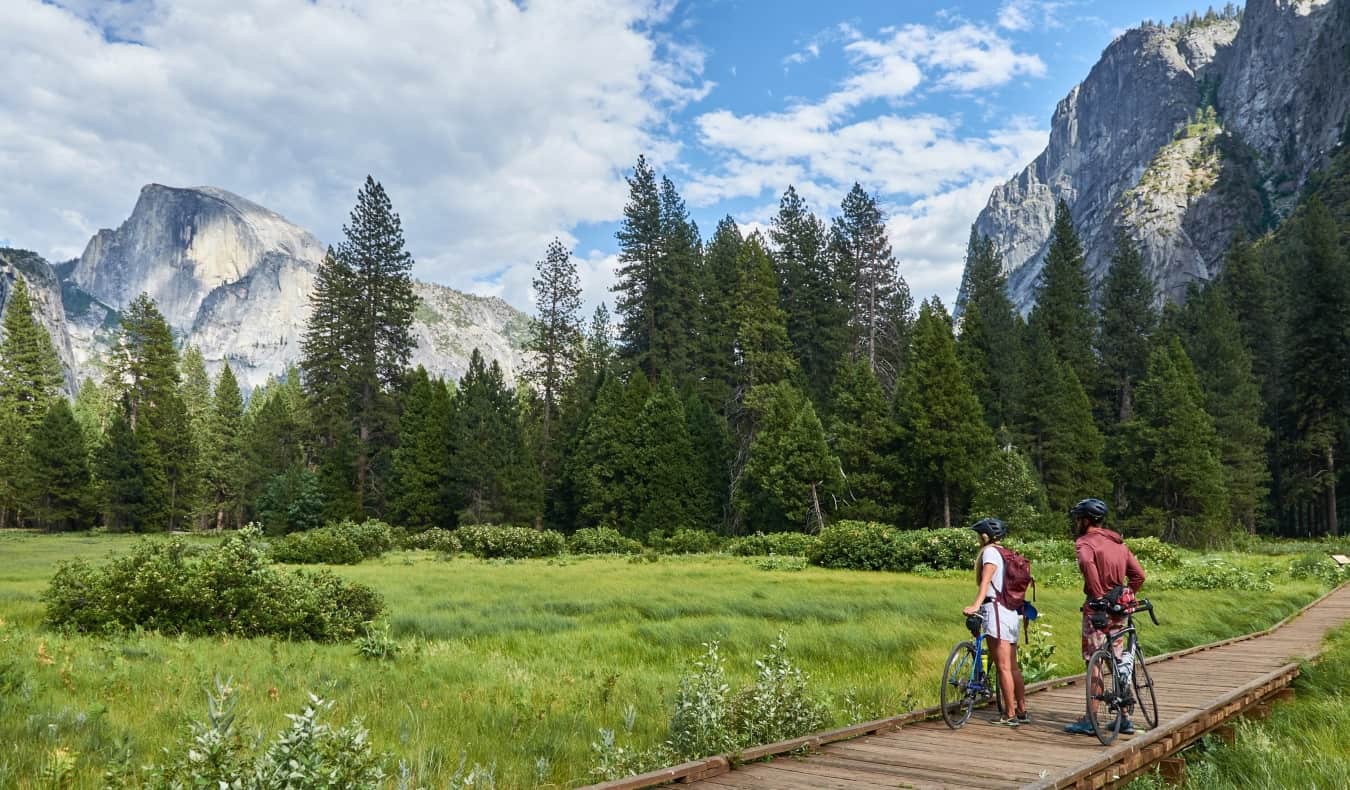
Environmentally friendly travel is now one of the fastest-growing movements in the industry, and I, for one, welcome this trend. It’s an incredibly important topic that I’ve been writing about for years .
After all, why destroy what you love? No one wants to see paradise paved over. We all cringe when we return to an overdeveloped, polluted destination. None of us want to contribute to that. Being an eco-friendly traveler is simply being a respectful traveler.
As we strive to become more environmentally conscious, the questions for travelers become:
Just how do we “green” our travels?
What can we do to lower our carbon footprint as we travel the world?
How can we better interact with the communities we visit?
What changes can we make that are actually helpful?
Flight shaming people is not the answer , but do we all just stay home and quit traveling? I don’t believe so.
In fact, there’s actually a lot we can do as travelers to reduce our ecological footprint while contributing to the sustainability of the communities we visit.
Here are 12 concrete ways to reduce your environmental impact as a traveler:
Table of Contents
1. Stay Close to Home
2. make greener transportation choices, 3. travel slow, 4. pack smart to reduce plastic use, 5. when you fly, do so more sustainably, 6. avoid overvisited destinations, 7. stay at locally owned accommodation, 8. eat local, 9. cut back on meat and dairy, 10. avoid animal attractions, 11. cut back on cruises, 12. take a nature-related trip.
Though the “exotic and different” is always appealing, travel doesn’t have to be about going somewhere far away. Travel is the art of exploration, discovery and getting out of your comfort zone , all of which can just as well be nearby. Find somewhere close to home you haven’t been, get in your car (or better yet, take the bus), and go visit. You never know what you’ll come across!
During the pandemic, we all learned to love traveling close to home. I myself road-tripped across the country , exploring destinations I’d never seen before (especially national parks, since it was the best way to avoid people). I’ve road tripped around the US a few times now and have learned a lot . I’ve even had some of my own misconceptions overturned just by traveling close to home.
You don’t have to go abroad to travel . Start at home. You might just be surprised what you discover.
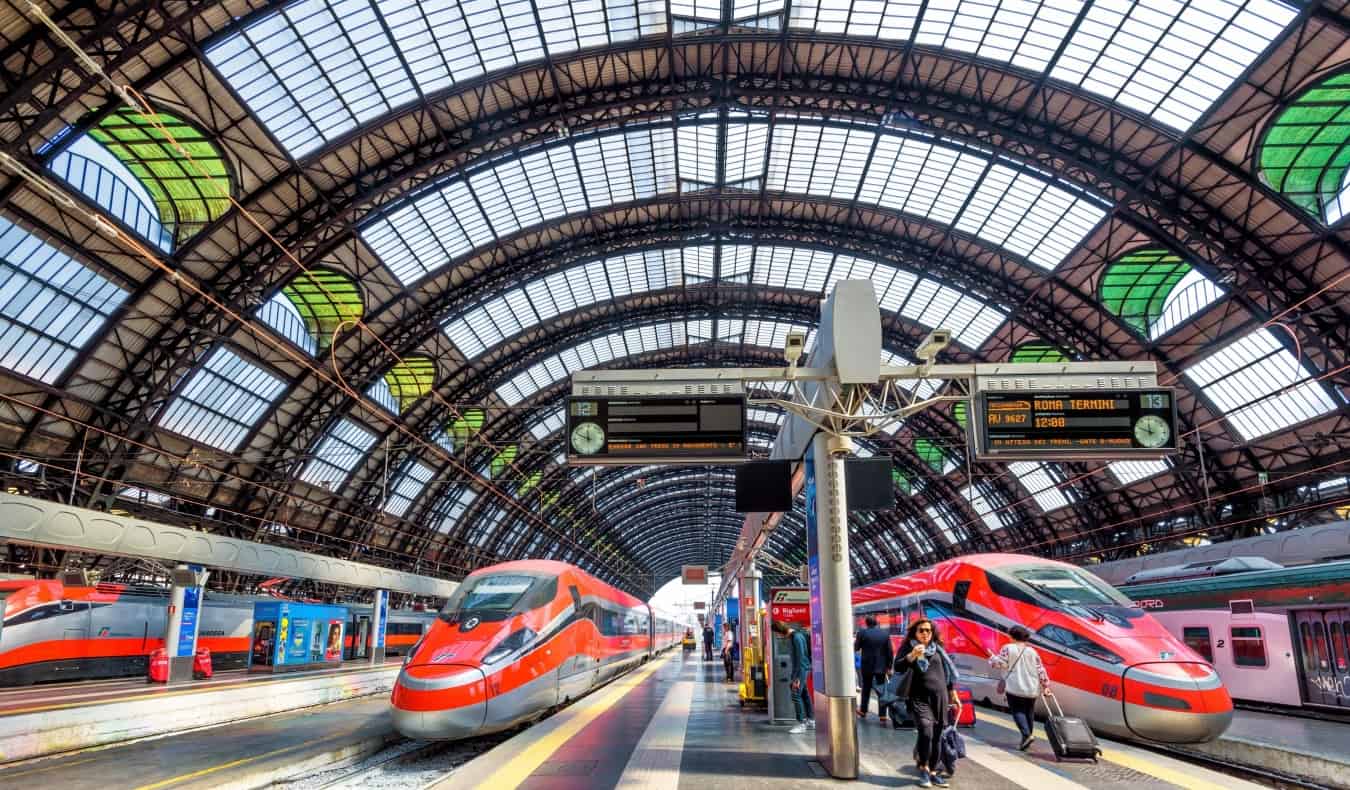
After walking, public transportation is the next best way to explore new destinations. Not only is it better for the environment, but it’s more culturally immersive (and cheaper) as well. When it comes to longer distances, buses and trains are your best way of getting around, both of which can be quite an experience in and of itself. In the U.S. and Europe, companies like FlixBus and Megabus always have cheap tickets if you book in advance.
When traveling by car, consider offering rides to (or getting rides with) other travelers to lower your collective emissions and cut costs. Ridesharing is a fun way to connect with locals and other travelers going the same direction. Use platforms like BlaBlaCar and Craigslist to find rideshares near you. If you’re staying in a hostel, see if there’s a bulletin board, group Whatsapp chat, or just ask around to see if anyone wants to carpool.
If you do need a taxi to get around a city, use the “pool” option offered by Uber and Lyft in many cities. This lets you split your ride with other travelers, and while it may take a little longer to get to your destination, it will save you money and make your taxi ride more eco-friendly.
Avoid flying or driving long distances by yourself whenever you can. These are the two least sustainable ways to travel.
Related posts:
- A Complete Guide to the Japan Rail Pass
- A Complete Guide to the Eurail Global Pass
- How to Get Around Southeast Asia on the Cheap
When we travel abroad, we have a tendency to rush around from place to place, trying to soak in as many sights as possible.
I get that.
After all, not everyone can be a permanent nomad, and when you have limited time and aren’t sure if you’re coming back again, I can see why people “travel fast.”
However, not only does this raise your transportation costs since you’re moving a lot, you end up increasing your carbon footprint. All those trains, buses, and planes add up. The fewer you take, the better.
Traveling to fewer destinations is good not only for your wallet and the climate, it’s good for local communities as well. Being a responsible traveler not only means reducing your carbon footprint but also doing good by the communities you visit. Day-tripping brings in very little money to communities but impacts their infrastructure heavily. (It’s why Venice will start charging day trippers a fee in 2024) . So try to stay at a destination for at least a night.
Slowing down your travels allows you to get to know places in a deeper way. In travel, less can be more.

While the specifics will depend on where you’re going, here are a few things you can bring to help you travel more sustainably:
- Reusable water bottle with a built-in filter – Many destinations don’t have potable water, which means you’re going to be buying tons of single-use plastic water bottles. Instead, bring a Lifestraw bottle with a built-in filter, or a SteriPen that you can use with any bottle you already have. These devices purify your water so you can drink from practically anywhere, ensuring you can avoid single-use plastic bottles.
- Tote bag/stuff sack – If you’re traveling long-term, bring a tote bag or an extra stuff sack. You can use them for buying groceries and avoid plastic bags. At other times, they can be used to keep your bag organized.
- Menstrual cup – While I can’t speak from personal experience, a reusable menstrual cup is something our resident solo female travel expert packs when she travels, since menstrual products are not always available (and can also be quite wasteful).
- Solid toiletries – Solid shampoo, conditioner, lotion, even toothpaste tablets not only help you avoid all those plastic bottles, but are great for carry-on only travel (no paying attention to liquid size limits). Depending on when you get them, they might even be refillable.
- Bamboo Utensils – Travel cutlery (a fork, knife, and spoon, or just a spork or a set of chopsticks) can come in handy if you’re on a budget and plan on cooking your own meals. But they’re also useful for street food and eating out, as you can avoid plastic cutlery.
- Small Tupperware container – I always find myself with extra food when I cook in hostels. Putting my leftovers in a container helps avoid waste and provides food for the next day. It’s an amazing travel tip surprisingly few people make use of.

While I don’t believe in flight shaming , it’s impossible to deny that flying does have a hefty carbon impact. In addition to limiting your flying, try to use longer flights with fewer connections. A significant portion of airplane emissions occur during takeoff and landing , which means if you fly shorter flights with more connections, your emissions will be drastically higher. Flying direct is simply the better option environmentally, so opt for that whenever possible.
Other ways to fly more sustainably include:
- Choose more efficient aircraft – Newer planes use less fuel, creating fewer emissions than the same route on an older carrier. Skyscanner (my favorite flight search engine) highlights flights with less emissions when you do a search.
- Pack less – More weight = more fuel needed. Whenever possible, pack less.
- Offset your flight – Carbon offsets aim to cancel out the effect of the emissions that you’re creating by taking that flight. It’s a tricky topic, as not all offsets are created equal. Always purchase offsets separately (rather than simply ticking the box when purchasing the flight) and choose a reputable company. And make sure to research where you buy your offset from.

And, from a sheer personal-enjoyment point of view, who wants to deal with crowds or long lines? No one.
Visiting less-visited destinations, such as “second cities” (the second- biggest or most important city in a country), can be much more enjoyable and rewarding to visit.
I try to look for nearby cities that people don’t really talk about a lot and go there. For example, you head to Lyon over Paris or Bologna over Venice or Memphis over Nashville. There are endless examples of places you can visit. Not only will you get a less touristy experience, you’ll help local communities.

Around the world, short-term apartment rentals drive up rents for locals and force them out of the city center. It’s gotten so bad in places that many cities are restricting Airbnb to protect residents. Stick to locally owned hotels, guesthouses, bed & breakfasts and hostels instead of using sites like Airbnb .
Unless you’re going to share accommodation with a local by using Couchsurfing , staying at locally-owned accommodation gives back directly to the community you’re visiting. Plus, you’ll have someone on hand to answer all your questions so that you can get even deeper into the place and culture.
If you have to use a site like Airbnb, use the “Rooms” feature. It lets you search for listings in people’s homes or guest houses. It’s like how Airbnb used to be — people renting out extra rooms or guest houses for added cash. You always get your own room and, sometimes, a private entrance. You’ll also get to interact with your host, who can provide lots of insider tips and insight to your destination. Plus, you don’t contribute to overtourism by taking housing off the market for locals. It’s a triple win.

Sure, the odd Western comfort meal is not the end of the world, but the more you eat locally, the more you reduce your environmental footprint and the more you help the local economy as well. After all, you didn’t come to Thailand to eat a burger you could get at home, right?
And, while not as cost-effective as eating street food or cooking your own meals, I also like taking food tours when I travel. Doing so is like taking a crash course in the local cuisine, plus you get a local guide who can give you recommendations on other foods or eateries to check out after the tour ends.
Here are some of my go-to food tour companies:
- Get Your Guide
- With Locals
You can also use EatWith , where locals post listings for dinner parties and specialty meals that travelers can join.
I’m not saying you need to go vegan. I love meat and never plan to give up sushi. But reducing your meat and dairy intake is extremely helpful. Livestock are responsible for an estimated 11-17% of global emissions , with ruminant animals and dairy accounting for over half of emissions from all food production .
So by cutting back on your meat and dairy consumption, you’ll drastically reduce your carbon footprint. (And especially avoid Brazilian beef if you can, as it generally comes from cleared rainforest land. Cattle ranching and growing soy for livestock feed are the biggest causes of rainforest deforestation in the world .)
Download the HappyCow app to find the best vegan and vegetarian options near you.
Part of traveling responsibly is helping the other creatures that inhabit his earth. That means you should avoid any and all attractions that use captive wild animals for entertainment . The most common offenders are riding elephants , swimming with dolphins, visiting captive whales, and petting (drugged) tigers.
These activities require animal abuse and imprisonment and should be avoided. Animals are typically kept in horrible conditions managed by inexperienced staff. Animal attractions exist to entertain tourists and therefore make money; they’re not sanctuaries or places concerned for the animal’s welfare. By visiting these institutions, we unintentionally become party to the system and perpetuate the cycle of abuse.
Animals are best viewed in their natural habitats. If you want to see them, go on a safari , jungle hike, gorilla trek or whale-watching tour and see the animals where they belong, in the wild.
If you want to be an ethical and responsible traveler, stick to taking photographs and avoid direct interactions with animals.
For more information on animal tourism and how to avoid it, check out these helpful organizations:
- World Animal Protection
- Wildlife Watch
- Save Elephant
- Born Free Foundation
- International Fund for Animal Welfare
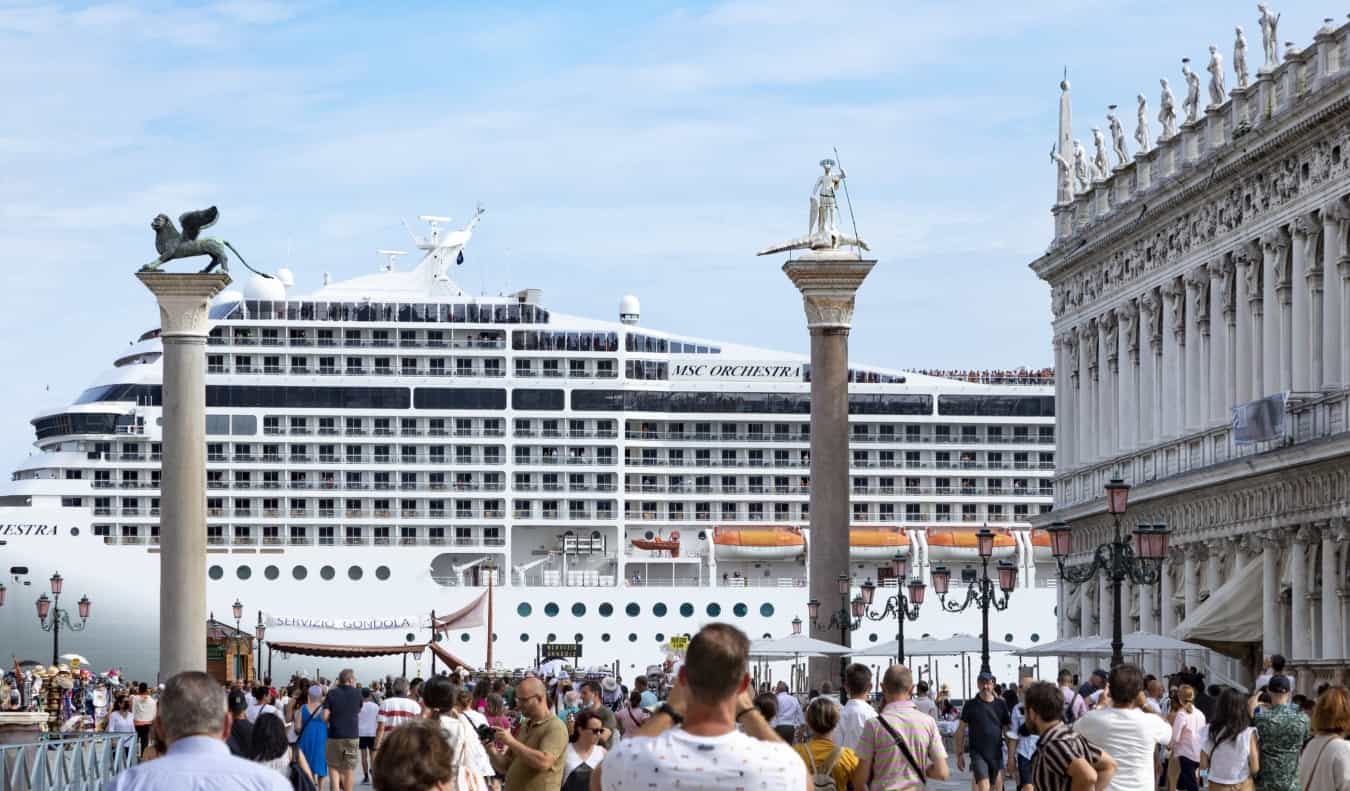
Cruises are one of the worst offenders when it comes to both carbon footprints and overtourism. One cruise ship emits as much greenhouse gases at 12,000 cars , creating more carbon emissions per passenger than a long-haul flight . Thanks to cruises, people and marine life are exposed to harmful pollutants, shortening their lifespans .
And that’s not to mention the dumping of toxic chemicals into the ocean’s waters or all the waste that comes from the all-inclusive nature of cruises.
To top it all off, day-trippers from cruises visits are overwhelming local economies, driving up prices, forcing out locals, and creating crowded destinations that are over-reliant on tourism, all while giving back very little (when you have already paid for all your meals and room on board, why spend extra in a destination?). Many cities are now trying to combat this by setting limits on cruise ship passenger numbers or charging a fee for them to get off the boat.
Don’t get me wrong: cruises are a fun way to travel . But cruise ship travel is only increasing , putting more strain on ports and the oceans. If you’re looking to lower your environmental footprint, you’ll want to avoid cruises as much as possible.
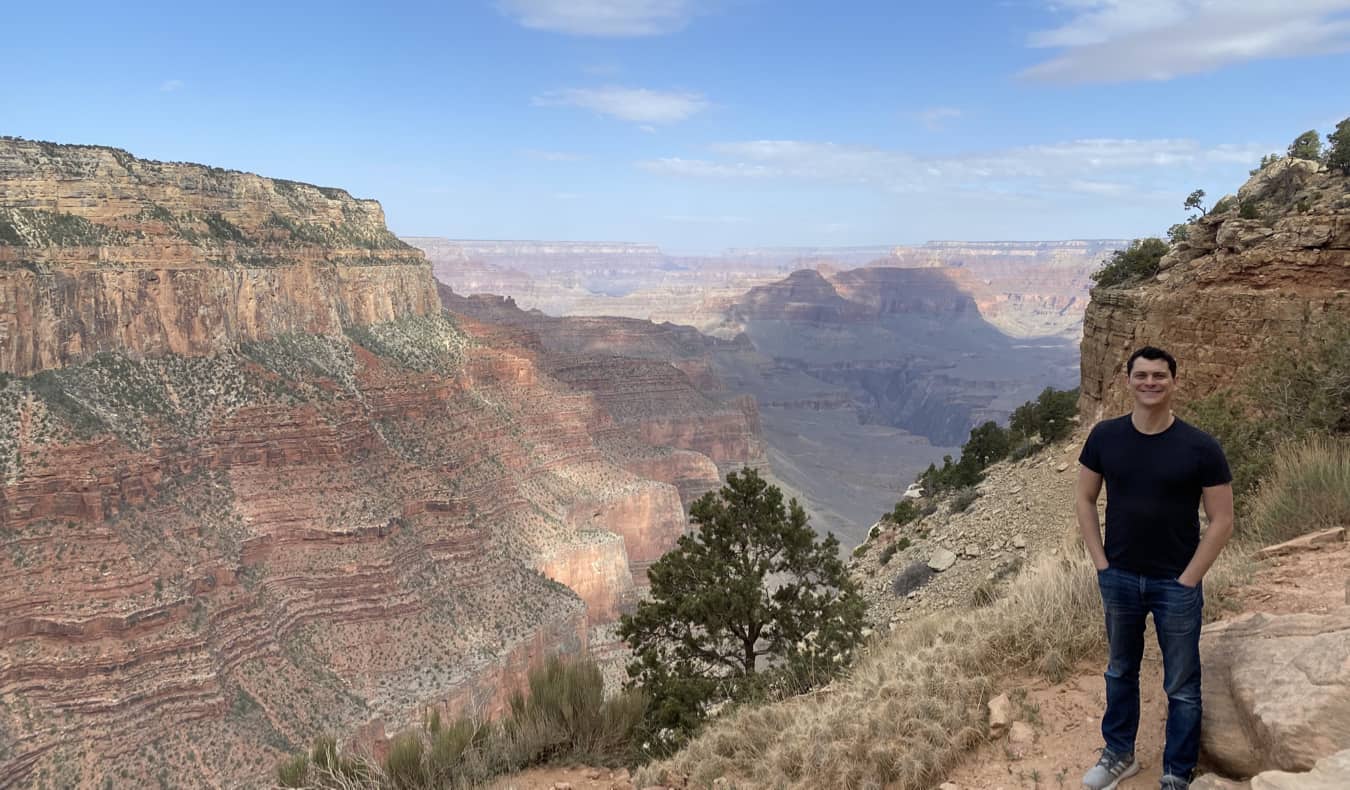
If you want to better understand and appreciate the natural world, try taking a trip with the sole purpose of connecting with nature. Head to the Australian Outback , go diving and swim around coral reefs, visit national parks, camp in the Moroccan desert , stay a few weeks in a town with little or no electricity, canoe down the Amazon River , or spend a few nights under the stars in a field close to home.
Do something that gets you in touch with the world in a way that sitting at home with all the electricity and free-flowing running water doesn’t. I promise that when you come home, you’ll have a new perspective on why we’re all so focused on being environmentally friendly these days.
It doesn’t take much to see that we are living unsustainably and something’s got to give. Going on a nature adventure can get you to think differently when it comes to the environment and how important it is for us to treat it well.
Traveling in a more green and eco-friendly way is something we should all aspire to. As travelers, it’s our responsibility to make sure that, while we explore the globe, we do so in a way that doesn’t harm the planet or the local communities that we visit.
With a few simple changes, you can all become better and more sustainable travelers. You just need to take that first step. Action begets action, and the more actions you take, the easier the other ones will be.
Book Your Trip: Logistical Tips and Tricks
Book Your Flight Find a cheap flight by using Skyscanner . It’s my favorite search engine because it searches websites and airlines around the globe so you always know no stone is being left unturned.
Book Your Accommodation You can book your hostel with Hostelworld . If you want to stay somewhere other than a hostel, use Booking.com as it consistently returns the cheapest rates for guesthouses and hotels.
Don’t Forget Travel Insurance Travel insurance will protect you against illness, injury, theft, and cancellations. It’s comprehensive protection in case anything goes wrong. I never go on a trip without it as I’ve had to use it many times in the past. My favorite companies that offer the best service and value are:
- SafetyWing (best for everyone)
- Insure My Trip (for those 70 and over)
- Medjet (for additional evacuation coverage)
Want to Travel for Free? Travel credit cards allow you to earn points that can be redeemed for free flights and accommodation — all without any extra spending. Check out my guide to picking the right card and my current favorites to get started and see the latest best deals.
Need Help Finding Activities for Your Trip? Get Your Guide is a huge online marketplace where you can find cool walking tours, fun excursions, skip-the-line tickets, private guides, and more.
Hi, I’m Nomadic Matt, the New York Times best-selling author of How to Travel the World on $50 a Day and Ten Years a Nomad, as well as the founder of this website! And I’m here to help you save money on your next trip.
Got a comment on this article? Join the conversation on Facebook , Instagram , or Twitter and share your thoughts!
Disclosure: Please note that some of the links above may be affiliate links, and at no additional cost to you, I earn a commission if you make a purchase. I recommend only products and companies I use and the income goes to keeping the site community supported and ad free.
Related Posts

GET YOUR FREE TRAVEL STARTER KIT
Enter your email and get planning cheatsheets including a step by step checklist, packing list, tips cheat sheet, and more so you can plan like a pro!

US Travel Header Utility Menu
- Future of Travel Mobility
- Travel Action Network
- Commission on Seamless & Secure Travel
- Travel Works
- Journey to Clean
Header Utility Social Links
- Follow us on FOLLOW US
- Follow us on Twitter
- Follow us on LinkedIn
- Follow us on Instagram
- Follow us on Facebook
User account menu
Sustainability.
Creating a better future for travel—and our planet.

All sectors of the travel industry are making strides to lower carbon emissions, reduce waste, protect the environment and safeguard our country's destinations and natural attractions.
Why it matters: Nine out of 10 travelers want more sustainable travel options and 76% of business executives want sustainable corporate travel choices–even if it costs more.
Our industry faces a sustainability imperative, and its long-term competitiveness and viability depend on developing strategies and practices that deliver impacts beyond the bottom line.
Ensuring the many natural resources and beautiful destinations across our country are preserved for generations to come is fundamental to travel’s future. U.S. Travel is championing industry actions and uniting industry leaders to advance strategies that enable more sustainable travel.
U.S. Travel’s Sustainability Goals:
- Spotlight industry progress by showcasing innovative technologies and calling attention to the ongoing actions and leadership of travel professionals in the sustainability space.
- Amplify industry goals and commitments to conservation, best practices, waste and emission reductions and both long and short-term investments.
- Highlight why sustainability matters and its importance to travel's future.
- Play offense by identifying and promoting proactive policies to help the industry achieve its goals.
- Defend against harmful policies that slow progress toward sustainability goals or penalize the industry without progress.
Recent Progress:
Journey To Clean—Sustainable. Responsible.
In March 2023, U.S. Travel launched Journey to Clean—Sustainable. Responsible. —a new website that celebrates actions and bold commitments the travel industry is taking to advance environmental sustainability at every stage of a traveler’s journey.
Developed with input from our Sustainable Travel Coalition , Journey to Clean spotlights more than 100 examples from over 50 contributing organizations across airports, airlines, destinations, lodging, attractions, rental cars and more that showcase the magnitude of our industrywide approach to achieving end-to-end sustainable travel.
Additional Progress:
- The U.S. Department of Transportation granted final approval for all 50 states, the District of Columbia and Puerto Rico to begin construction of a nationwide network of EV charging stations.
- The U.S. Energy Department plans to increase production of sustainable aviation fuels.
- The bipartisan Infrastructure Investment and Jobs Act secures historic levels of travel infrastructure investment—including for airports, railways, highways, electric vehicle charging infrastructure and more—to accelerate the future of travel mobility.
- The new National Electric Vehicle Infrastructure (NEVI) Formula Program — announced by the Biden administration—will make nearly $5 billion available for foundational investments in a national EV charging network that will shape the future of mobility in America.
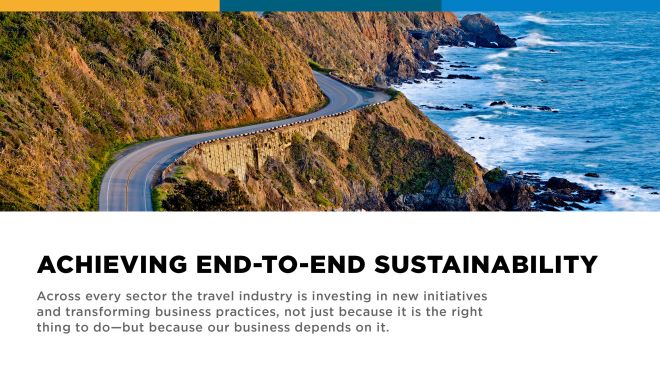
KEY RESOURCE LINKS
U.S. Travel
For more information about this Issue, please contact us at:
202.408.8422
Research, News and Commentary on Sustainability

WEBINARS Plug Into EV Charging Funding Opportunities

PRESS RELEASE Travel Industry Unites to Help Travelers Choose Sustainable Options

PRESS RELEASE U.S. Travel Commends Approval of EV Charging Network
U.S. Travel Reacts to Energy Dept. Plan to Increase Production of Sustainable Aviation Fuels

U.S. Travel Association Executive Vice President of Public Affairs and Policy Tori Emerson Barnes issued a statement on the U.S. Energy Department plan to increase production of sustainable aviation fuels (SAF).
Five Key Takeaways from the Future of Travel Mobility Conference

Following the Future of Travel Mobility conference in Washington, D.C., U.S. Travel's Tori Emerson Barnes shares her five key takeaways.
Biden’s Detroit Auto Show Visit Highlights Importance of Public and Private Sectors Uniting to Shape Sustainable Travel

The U.S. Travel Association welcomed President Biden’s tour of the Detroit Auto Show as part of an ongoing effort to build a more sustainable future for travel mobility.
Our Sustainability Imperative: Building a Greener Future

When it comes to the issue of sustainability, the industry is reaching a critical inflection point—one that will have a lasting impact on the decades ahead.

Essay on Sustainable Tourism
Students are often asked to write an essay on Sustainable Tourism in their schools and colleges. And if you’re also looking for the same, we have created 100-word, 250-word, and 500-word essays on the topic.
Let’s take a look…
100 Words Essay on Sustainable Tourism
What is sustainable tourism.
Sustainable tourism means visiting places in a way that helps the environment, supports local cultures, and promotes economic growth. It’s about enjoying our travels while making sure future generations can too.
Why It Matters
Tourism can harm nature, use lots of resources, and disturb local ways of life. Sustainable tourism tries to fix these problems. It encourages us to respect nature, use resources wisely, and support local communities.
How to Practice Sustainable Tourism
We can choose eco-friendly places to stay, use public transport, and buy local products. This helps reduce pollution and supports local businesses. By making these choices, we contribute to a healthier planet.
250 Words Essay on Sustainable Tourism
Sustainable tourism means visiting places in a way that helps the environment, society, and economy of the area. It’s like being a guest at someone’s home and making sure you don’t cause any harm. This kind of tourism makes sure that beautiful places can be enjoyed by future generations too.
Why is it Important?
Our planet has many wonderful places, but if too many people visit them without caring for the environment, these places can get damaged. Sustainable tourism is important because it helps protect nature and wildlife, supports local businesses, and ensures that tourists have a good time without harming the place they visit.
When you travel, you can practice sustainable tourism by staying in hotels that care about the environment, using public transport or walking instead of driving, and buying souvenirs from local artisans. It’s also good to respect the local culture and traditions.
Benefits of Sustainable Tourism
Sustainable tourism has many benefits. It helps protect the environment, supports local economies by creating jobs, and provides a better experience for tourists. When places are not overcrowded and nature is preserved, tourists can really enjoy the beauty and uniqueness of their destination.
In conclusion, sustainable tourism is about enjoying our travels while making sure we leave places as beautiful as we found them. By choosing to travel this way, we can help protect the environment and ensure that future generations can also enjoy the wonders of our world.
500 Words Essay on Sustainable Tourism
Sustainable tourism: a journey that fosters harmony with the environment and local communities.
Sustainable tourism aims to minimize negative impacts on the environment and local communities while promoting economic growth. It encourages responsible travel practices that respect and protect natural and cultural heritage. This type of tourism revolves around using resources wisely, reducing pollution, conserving biodiversity, and supporting local economies. It ensures that future generations can enjoy the same natural and cultural riches that we are fortunate to experience today.
Responsible Travel: A mindful approach to exploration
Sustainable tourism encourages responsible behavior among travelers. This includes respecting local cultures, traditions, and customs. It also involves being mindful of the impact of travel on the environment, such as reducing waste, conserving water and energy, and minimizing carbon emissions. Responsible travel is about appreciating the unique qualities of a destination while leaving a positive legacy for future visitors.
Community Engagement: Empowering Local People
Sustainable tourism actively supports local communities by involving them in the tourism industry. This can take many forms, such as creating job opportunities, promoting local businesses, and preserving cultural heritage. Community engagement ensures that the benefits of tourism are shared fairly and that local people have a say in the development of tourism in their area.
Environmental Conservation: Preserving Nature’s Beauty
Sustainable tourism strives to protect and conserve the natural environment. This involves minimizing the impact of tourism on wildlife, habitats, and ecosystems. It also includes promoting responsible wildlife tourism practices and raising awareness of the importance of biodiversity conservation. Sustainable tourism recognizes that the beauty of natural landscapes is one of the main reasons people travel, and it aims to preserve that beauty for generations to come.
Economic Sustainability: Creating a Thriving Ecosystem
Sustainable tourism supports the local economy by creating job opportunities in tourism-related industries. It also encourages the development of small businesses and entrepreneurship. This economic growth benefits the local community and helps to ensure that tourism is a sustainable industry in the long run.
Conclusion: Striving for a Brighter Future
Sustainable tourism is a thoughtful and responsible approach to travel. It focuses on minimizing negative impacts on the environment and local communities while promoting economic growth. By embracing sustainable tourism practices, travelers can ensure that their adventures do not come at the expense of the natural and cultural heritage of the destinations they visit. Together, we can create a more sustainable and fulfilling way to explore our beautiful world.
That’s it! I hope the essay helped you.
If you’re looking for more, here are essays on other interesting topics:
- Essay on Teeth
- Essay on Use Of Public Transport
- Essay on Use Of Solar Energy In Daily Life
Apart from these, you can look at all the essays by clicking here .
Happy studying!
Leave a Reply Cancel reply
Your email address will not be published. Required fields are marked *
Save my name, email, and website in this browser for the next time I comment.

We use cookies to ensure best experience for you
We use cookies and other tracking technologies to improve your browsing experience on our site, show personalize content and targeted ads, analyze site traffic, and understand where our audience is coming from. You can also read our privacy policy , We use cookies to ensure the best experience for you on our website.
- Leaders Speak
- Brand Solutions
- Speaking Heads
- Sustainable tourism: A key driver in global traveller decision making
- Amandeep Kaur ,
- ETHospitalityWorld
- Published On May 30, 2024 at 01:00 PM IST
According to a 2023 survey by Booking.com, 83 percent of global travellers prioritise sustainable travel, with 61 percent expressing a heightened interest in sustainable travel post-pandemic. Additionally, 49 percent feel there's a shortage of sustainable travel options. This data underscores the escalating significance of sustainability in travellers’ decision-making processes, stimulating demand for responsible and eco-friendly travel alternatives. World Environment Day exemplifies global initiatives like those led by the United Nations to spotlight nature's importance. At ITC Hotels , environmental stewardship is paramount in crafting guest experiences and delivering luxury. Our ethos of Responsible Luxury is epitomized through initiatives like our EV charging station and in-house herb garden. The EV station, accessible to all guests, aims to curb carbon emissions, showcasing our hotel as the premier choice for eco-conscious travellers. Meanwhile, our herb garden mirrors our ongoing commitment to reduce carbon footprint by sourcing locally. Advt A 2022 survey by the Global Business Travel Association revealed that 74 percent of business travellers consider sustainability when making travel choices, with 68 percent willing to pay extra for eco-friendly options. These findings underscore the mounting expectation for hotels to embrace sustainability and offer eco-conscious amenities. Our property stands as a sustainability beacon in hospitality. As Asia's first LEED Platinum-rated green hotel and a LEED Zero Carbon Certified hotel, we continually push eco-friendly boundaries. From harnessing 100 percent renewable wind energy to pioneering water and waste recycling systems, our hotel embodies an unwavering environmental commitment, setting industry benchmarks for responsible luxury. These initiatives complement our holistic environmental approach, tailored to meet evolving guest preferences. Today's travellers increasingly prioritise environmental consciousness, seeking accommodations that align with their values. Sustainability is no longer a niche concern but a focal point in hospitality, driven by heightened consumer awareness and demand for eco-friendly practices. the author, Amandeep Kaur is general manager of ITC Gardenia in Bengaluru. The views expressed in this article are her own and do not necessarily reflect those held by ET HospitalityWorld.
- By Amandeep Kaur ,
- Updated On May 30, 2024 at 01:00 PM IST
All Comments
By commenting, you agree to the Prohibited Content Policy
Find this Comment Offensive?
- Foul Language
- Inciting hatred against a certain community
- Out of Context / Spam
Join the community of 2M+ industry professionals
Subscribe to our newsletter to get latest insights & analysis., download ethospitalityworld app.
- Get Realtime updates
- Save your favourite articles
- sustainable tourism
- eco-friendly travel
- responsible luxury
- global travellers
- leed platinum
- hospitality sustainability
- amandeep kaur

The Importance of Sustainable Travel and 12 Tips to Be a More Responsible Traveler in 2024
Eco friendly travel has never been more important for our children, for our environment, and for our future, the importance of eco friendly travel and 12 tips to be a more sustainable traveler.
Sustainable travel…it’s so hot right now! Not only is it trendy to travel and live more sustainably, it’s also vital to the future of our children and the future of our planet!
I recently spent the past week at the Study Abroad Summit where we discussed the benefits of study abroad, but we also talked about the state of travel, its impact on cultures and the environment, and the importance of sustainable travel.
As travelers who value sustainability, our goal is to leave the places we visit better than we found them. The “leave no trace” principle is one way to embrace our green values on vacation, but there’s more to it than picking up after yourself.
Disclaimer that I am FAR from a perfect responsible traveler and definitely far from a perfect responsible citizen of Earth, but I am trying to be better every day and continue to learn from my mistakes and from others around me who know better.
The UN declared 2017 the “Year of Sustainable Tourism” in an effort to draw attention to the fact that many tourist destinations were not, in fact, environmentally sustainable. One of the goals of this initiative was to encourage travelers to make a positive impact on the environment, society and local economies.
A study conducted by the University of Sydney found that global tourism accounts for 8 percent of carbon emissions, with the U.S. ranking the highest, followed by China, Germany, and India. The global industry is worth over $7 trillion.
I’m not telling you to stop traveling. I personally believe that the benefits that travel can have (if done properly) can outweigh the damage it does. The ability to expand knowledge and open minds directly results in travelers becoming more likely to advocate for the environment and cultures outside their own.
So how can you travel the world sustainably? We have a few ideas.
1. Choose a Sustainable Destination
Not all places are created equal — is your destination sustainable?
If you need some ideas about which destinations are sustainable, I’ve compiled this great list of alternatives to places suffering from overtourism.
Traveling to a conservation-minded destination is one of the greatest things a traveler can do, according to World Wildlife Fund’s vice president of travel, tourism, and conservation Jim Sano .
There is such a thing as overtourism, according to an article in National Geographic , and places like Amsterdam, Venice, and Barcelona are prime examples. These places have not historically been conservation-minded, but are instead focused on getting as many people as possible to visit and contribute to the local economy.
While that seems like a good thing, overtourism disrupts the local communities’ way of life. It also increases the cost of living, pushing out residents who can no longer afford to live there. Mass travel, according to National Geographic, poses real threats to natural and cultural treasures.
Cruise lines are major offenders when it comes to this mindset, dumping out thousands of people at a time onto islands and other communities. Aside from the fact that cruises are bad for the environment and contribute to a lot of food waste, their labor practices also leave a lot of room for improvement .
Barcelona is one of the world’s busiest cruise ports, and officials there are making changes to the laws surrounding mass tourism. Port cities in other areas of the world are restricting the number of ships that can dock.
And it’s not just cruise destinations. Amsterdam is working on tourist redistribution techniques, and countries in Asia are closing entire islands. Even Reykjavik, Iceland, has banned permits for new hotel construction downtown .
Venice also just disallowed cruise ships from docking as of next year.
So, with that in mind, choose a path less traveled. Look for areas that aren’t as frequently visited by tourists and contribute to economies that don’t benefit from masses of tourists descending on their town.
Visiting places that put effort into being sustainable encourages other towns to do the same.
2. Be Aware of Your Carbon Footprint
Oh, the places you’ll go — but what’s your carbon footprint?
Environmental purists will say that the most sustainable thing a traveler can do is to stay home. That way, there’s no carbon footprint. I’m not suggesting you stay home. As I stated above, I believe the benefits of travel done properly outweigh the damage.
Air travel is often the only way we can reach certain destinations, and flying has a significant impact on air quality. Many airlines, however, are now eco-friendly, including KLM, United, and Qantas, or offset their carbon footprint. The website Atmosfair.de ranks 200 of the largest airlines in the world based on their environmental impact and climate efficiency.
Fly direct when possible to cut down on emissions even further. Take-offs and landings create most of an airplane’s carbon emissions, according to Green Global Travel .
Once you’re in-country, check out high-speed trains. The Eurostar in Europe is an energy-efficient option. Consider slow travel , staying in one place for a longer period of time, rather than traveling from place to place.
Slow travel allows you to absorb the culture in a way that traditional vacationers don’t. Rather than visiting destinations as a checklist, pick a place and stay there. Doing this is cheaper, more environmentally-friendly and creates less stress.
Most people come home from vacation saying they need a vacation from their vacation. A frantic pace while traveling often defeats the purpose of getting away. The slow movement — slow travel, slow food, slow families — creates a chance to connect more deeply to the things that are important.
3. Be Conscious of Where You Stay
Lots of Lodging Options say they’re green — are they greenwashed?
If you’re an eco-conscious traveler, finding a place to stay that’s “green” is appealing. A hotel guest generates around two pounds of waste per day, according to the International Tourism Partnership , so knowing that the environment isn’t worse off for your stay is a good thing!
Because sustainability is becoming more and more important to travelers, most hotels claim that they are environmentally conscious or even “green.” But just because they claim it doesn’t mean it’s true.
A study by Washington State University showed that “greenwashing” is off-putting to customers who value sustainability. Greenwashing means that the hotels say they’re eco-friendly in an effort to draw more customers, but don’t actually do anything to back it up. Encouraging guests to reuse towels, for example, is not enough to really be considered green.
While there are a lot of eco-conscious hotels to choose from, they aren’t the only options. Travelers can stay at hostels, couch surf, use campsites, rent an Airbnb or swap homes.
Airbnbs have their downside, too. Investors have been known to buy up blocks of apartments and rent them out as short-term rentals, elbowing out residents who used to live there. However, there are still plenty of homes or rooms that can be ethically rented.
In some places, like New York City, it’s illegal to rent an entire apartment on Airbnb for less than 30 days . Despite that, it’s one of Airbnb’s hottest markets. Barcelona, Japan, Paris, Berlin and other places all have strict laws regarding the practice, so check the laws before booking your stay.
Wherever you decide to stay, do your homework and check out the reviews of your lodging options before you book them.
4. Do Your Part
It’s All in the Details — Are You Watching Your Own Habits?
No matter where you end up staying, remember to practice the same basic environmentally friendly habits you have at home. Turn the lights off when you leave a room, reuse towels and use reusable containers and bottles instead of disposable products. If there’s an option to use renewable energy, make sure to shift to it instead.
Beyond that, use the “do not disturb” sign on the door to prevent extra vacuuming and changing of linens. If you go on outdoor adventures, remember to stay on the path to avoid disturbing native flora, pick up trash as you go, and don’t feed the wildlife.
And of course, don’t litter, and try to avoid wasting food.
The Food and Agriculture Organization of the United Nations says that a third of the food in the world gets wasted by rotting during transport or being thrown out.
Food makes up nearly 20 percent of the waste in landfills. As it rots, it produces methane, a gas that has 21 times the global warming potential of carbon dioxide. Because of that, the EPA has made it a priority to cut food waste in half by 2030.
If your lodging has a recycling program, use it.
5. Think About Water
By now, everyone knows that plastic water bottles are the bane of the environment! In case you haven’t heard, they’re killing our Earth, so we need to stop using them! But I know that’s not always easy when traveling.
But here is some motivation for you:
- Plastic bottles take up to 700 years to disintegrate
- 90% of bottled water is the bottle itself
- 80% of plastic bottles never get recycled
- 38 million plastic bottles go to landfill each year in America alone!
- 24,000,000 liters of oil is needed to produce these billions of plastic bottles
- The average American consumes 167 bottles of water per year
- Americans purchase about 50 billion water bottles per year
- Bottling water and shipping transport is the least energy-efficient method of water supply in the history of mankind
- Bottled water is the second most popular beverage in the United States
Phew! And that is JUST water bottles, we are not even talking about other single-use plastics, like shampoo bottles, etc.
Reusable water bottles are great in places where water isn’t scarce, but if you’re traveling to a country where it’s unsafe to drink the water or even an area facing a water crisis, you’ll have to think hard about how you’ll handle not just hydration, but hygiene.
Travel blogger Shivya Nath , who travels frequently to India, suggests requesting filtered water refills from restaurants, or asking for a jug of filtered water for your hotel room and using that to refill your bottle. You can purchase water bottles already fitted with a filter, which then allows you to refill with water from anywhere. You can also purchase portable water filters that use ultraviolet technology to purify water.
Water purifying tablets are also available.
Water conservation is another aspect of this issue. Take a shower — limited to 10 minutes — instead of bathing, and turn the faucets off as you brush your teeth or shave. Filling up a bathtub takes , on average, 30 gallons of water, while a low-flow showerhead uses about 2 gallons a minute.
6. Reduce Single-Use Plastics
Now that I’ve got your attention about water bottles, let’s talk about other single use plastics such as straws, shampoo bottles, plastic utensils, plastic bags, and many many more products we use on a daily basis, probably without even considering the environment.
It’s difficult to reduce the use of these in everyday life and even harder to do while traveling. It seems that almost every hotel has tiny bottles of shampoo that will give my hair one wash.
You can help by trying to staying in green hotels where they have soap dispensers vs. tiny bottles.
You can also help by bringing your own bar shampoo and conditioner, using bamboo toothbrushes, and refusing straws at restaurants.
Bring reusable containers as you travel and bring food back with you to save for lunch the next day. If that isn’t possible, consider sharing meals as you dine, or ask for half portions. Travel with reusable water bottles, travel mugs, cloth shopping bags, metal straws, and utensils.
Efforts are being made all around the world to reduce single use plastics. Paris has recently banned plastic dining ware, like utensils and plastic cups, which is awesome! I’m hoping to see more cities and countries implement these guidelines around the globe. But the change has to start with us, the traveler!
These are small and simple things that add up to make a big impact on the environment while traveling.
7. Pack Wisely
Only bring what you need. This will make your life so much easier while traveling and allow you to use public transportation with ease. This is a great list of zero waste travel essentials.
Also, be mindful of any chemicals that you may be bringing to a destination. This is especially important with vacation hot spots like Hawaii where you’ll be spending a lot of time in the ocean. Be sure to pack reef-safe sunscreen to protect the ocean’s vital ecosystems.
8. Eat Less Meat
You may not know this, I didn’t until recently, but going vegetarian is one of the best things that we can do for the environment! It’s not only good for our bodies but reduces methane emissions and land clearing for livestock use.
9. Use Public Transportation When Possible
This can be a tough one in many destinations, but when possible use economical and environmentally friendly public transit options like trains. I spend 4 months backpacking around Italy with my kids using trains almost exclusively. It was actually great!
10. Be Intentional About Souvenirs
Try to choose souvenirs that you and your loved ones will actually use or treasure, not something made from plastic that will be thrown away the next time you move.
Even better, go for something consumable like local chocolates, spices, or oils.
Check the labels to see that it’s actually a product made in that destination. For example, most of the shell souvenirs you find in Hawaii are made in the Philippines. Go to local markets and find a way to support local artists or craftspeople.
11. Have Respect
R-E-S-P-E-C-T Respect the Culture and Habitat – What Activities Will You Participate In?
Study up on local customs and manners before you visit another country. Avoid taking pictures of locals without asking for permission first. It’s respectful to learn a few important words in the language of the country you’re visiting, and will greatly benefit you when you have questions.
Try to buy locally made items if you purchase souvenirs. Many vendors sell mass-produced items made in another country.
Avoid participating in activities that exploit animals, like riding elephants, drinking civet coffee or even taking selfies with tigers, a common tourist activity in Thailand .
Exercise that same sensitivity when visiting religious or sacred sites. The World Travel and Tourism Council says that even if it’s permissible to take part in an activity, your actions should align with those for whom the site holds a deep significance.
The keyword for all of these things is respect: for the natural environment, the location and the local people who live there.
12. Talk About Sustainable Travel
Possibly the most important thing we can do as sustainable travelers ourselves is to talk about how we are traveling sustainably, what our struggles are, and how we can help ourselves and others to be more mindful when we travel.
Don’t be critical of others not yet traveling sustainably. We can and should lead by example!
Share your stories, efforts, and struggles with your friends and family, and on social media.
If you see a company, hotel, or organization making concerted efforts towards sustainable travel, tell them “thank you” and continue to give them your support.
Practical Tips for Booking your Trip
Book Your Flight s and Car
Find a budget airlines by using Skyscanner . This is my favorite way to search for flights because they crawl websites and airlines around the globe, so you always know you’re getting the best deal. Learn more tips for finding the best flight deals here.
For cars, I like to use Rental Cars because they have good filters and its easy to search for multiple companies.
Book Your Accommodation
My preferred way to stay around the world is VRBO . I find it usually gives you a unique local experience in any destination. If you want to stay in a hotel, use Booking , as it consistently gives the cheapest rates for guesthouses and hotels. I use them both all the time.
Always Get Travel Insurance
Travel insurance protects you and your family against illness, injury, theft, and cancellations. It’s peace of mind in case anything goes wrong. I never travel without it. I’ve been using World Nomads for the last few years and love how easy it is to use. I have also used Allianz . Compare rates to see which is best for the coverage you need.
Looking for ways to save money on travel?
Check out my resource page for the companies I use for traveling! I share everything I use to save me time and money.
This was written together with Sam Reed, a content writer at PTAC4Less, an online retailer of new and refurbished PTACs , along with a full range of parts and accessories.
The post The Importance of Sustainable Travel and 12 Tips to Be a More Responsible Traveler in 2024 appeared first on Wanderlust Crew .
![Eco friendly travel has never been more important for our children, for our environment, and for our future! The Importance of Eco Friendly Travel and 12 Tips to Be a More Sustainable Traveler Sustainable travel…it’s so hot right now! Not only is it trendy to travel and live more sustainably, it’s also vital to the [...] Eco friendly travel has never been more important for our children, for our environment, and for our future! The Importance of Eco Friendly Travel and 12 Tips to Be a More Sustainable Traveler Sustainable travel…it’s so hot right now! Not only is it trendy to travel and live more sustainably, it’s also vital to the [...]](https://img-s-msn-com.akamaized.net/tenant/amp/entityid/AA13W3mt.img?w=768&h=512&m=6)

IMAGES
VIDEO
COMMENTS
Asking questions — both while you're traveling and, more important, before you book — is one of the most powerful things that travelers can do, said Gregory Miller, the executive director of ...
The single more significant way to reduce the carbon emissions of travelling is to tackle the transport portion, which is often responsible for at least 70% of the carbon emissions of a holiday ...
Sustainable tourism considers its current and future economic, social, and environmental impacts by addressing the needs of its ecological surroundings and the local communities. This is achieved ...
This day highlights the importance of sustainable tourism —a framework for engaging travelers and the travel industry at large in supporting goals that include protecting the environment ...
Sustainable tourism (or responsible tourism) is a real important concept. Find out the definition. This piece on sustainable tourism, its definition, principles, and types, is provided by Smart Writing Service, a professional essay writing service that cares about students.You may find out that the structure of this essay slightly differs from a standard one for a definition essay.
Sustainable travel is an enriching and fulfilling way to experience the world. We can help ensure the preservation of our planet for future generations while enjoying authentic, unique experiences ...
April 13, 2018. The term " sustainable travel " has a green glow to it, connoting eco-friendly practices and environmental responsibility. But the human side of sustainability, as defined by ...
Katherine Gallagher is a writer and sustainability expert. She holds a B.A. in English Literature from Chapman University and a Sustainable Tourism certificate from the GSTC.
Tourism rose to the forefront of the global agenda in 2020, due to the devastating impact of COVID-19. Recovery will be driven by technology and innovation - specifically seamless travel solutions, but it will be long, uneven and slow. Success hinges on international coordination and collaboration across the public and private sectors.
In this sustainable tourism guide, you can learn what sustainable tourism means and why it matters, including real-world examples.
This paper aims to study the progress of research on Sustainable Tourism and to outline and identify the key disciplines, journals, articles and authors. This is carried out through a wide, in-depth, and structured examination of published scholarly papers. In recent decades, sustainable tourism has been one of the most significant subjects ...
Sustainable tourism can be defined as a kind of tourism that has more benefits than negative impacts, especially relating to the environment, the economy and communities. Truly sustainable and responsible tourism should make destinations better for people to live in as well as visit.
In paragraph 131, Member States "encourage the promotion of investment in sustainable tourism, including eco-tourism and cultural tourism, which may include creating small- and medium-sized enterprises and facilitating access to finance, including through microcredit initiatives for the poor, indigenous peoples and local communities in areas ...
Avoid the plane and take the train. Become part of the emerging "slow travel" trend by going to fewer places and spending more time in each. Train travel is a good way to do this. Not only ...
One of the most crucial steps toward making tourism more sustainable is to concentrate on sustainable transportation, in which case multimode transport resilience becomes essential (Liu et al., 2022). Cooperative and flexible travel decisions can advance travel and transportation sustainability, improving tourist sustainability.
The rising opportunities of sustainable tourism have brought many policies to control the exploitation of the environment and increase the reach of luxurious, safe, and authentic experiences to the different segments of tourists. This study seeks to prioritize the variables influencing the development of sustainable tourism and pinpoint key success factors that align with the Sustainable ...
When air travel is unavoidable, opt for direct flights and purchase carbon offsets. Don't forget to pack light too. 2. It allows wildlife to stay wild. Preserving wildlife is a major part of responsible tourism. But in many destinations, animals are used to attract tourists, but are not necessarily treated well.
Sustainable tourism project must also provide socio-economic benefits, long-term economic availability, stable employment, poverty reduction, social services, and generation of income to the host community and all stakeholders. First, regulations are forms of ensuring sustainability of tourism destinations.
Other documents such as conference papers, book reviews, book chapters, books, and conference reviews were excluded from this analysis as articles tend to be peer ... (17); Sustainable travel (5) Waste reduction, energy saving, recycling: 16: 4.83: Recycling (3) Green consumption: 6: 1.81: Non-specific sustainability pillar related: 140: 44.41 ...
8. Eat Local. Food that is imported has a much higher carbon footprint than locally grown food (and it's usually not as fresh either). To keep your carbon footprint down, eat like a local. Stick to foods that are grown locally, and avoid packaged and imported foods much as possible.
In March 2023, U.S. Travel launched Journey to Clean—Sustainable. Responsible. —a new website that celebrates actions and bold commitments the travel industry is taking to advance environmental sustainability at every stage of a traveler's journey. Developed with input from our Sustainable Travel Coalition, Journey to Clean spotlights ...
Sustainable tourism encourages responsible behavior among travelers. This includes respecting local cultures, traditions, and customs. It also involves being mindful of the impact of travel on the environment, such as reducing waste, conserving water and energy, and minimizing carbon emissions. Responsible travel is about appreciating the ...
According to a 2023 survey by Booking.com, 83 percent of global travellers prioritise sustainable travel, with 61 percent expressing a heightened interest in sustainable travel post-pandemic. Additionally, 49 percent feel there's a shortage of sustainable travel options. This data underscores the escalating significance of sustainability in travellers' decision-making processes, stimulating ...
Compose Essays on Ecotourism and Sustainable Travel Skillfully with EssayGPT. Draft and Fine-Tune in a Flash. EssayGPT's essay generator can create ecotourism and Sustainable Travel essays of any type in a moment. And you can type // to activate our editing tools to polish or change the content of your essay.
Eco friendly travel has never been more important for our children, for our environment, and for our future! The Importance of Eco Friendly Travel and 12 Tips to Be a More Sustainable Traveler